Entrepreneurship Intentions: A Study in Klang Valley, Malaysia
VerifiedAdded on 2022/09/29
|18
|4690
|25
Report
AI Summary
This report investigates the factors influencing entrepreneurship intentions among young adults, particularly students and graduates, in Klang Valley, Malaysia. It explores the significance of entrepreneurship for economic growth and the role of intentions in driving entrepreneurial behavior. The study focuses on the Theory of Planned Behavior (TPB) to analyze the attitudes, subjective norms, and perceived behavioral control that shape intentions. The literature review covers entrepreneurship, entrepreneurial intentions, entrepreneurship education, and personal skills. The report highlights the influence of education, skills, and motivational factors on young people's inclination towards starting businesses. It also discusses the importance of entrepreneurship education in shaping intentions and the role of personal skills in enhancing entrepreneurial actions. The TPB is presented as a framework for understanding the relationship between intentions and behavior, including the influence of background dynamics. The report underscores the need for resources and education to support entrepreneurial endeavors in Klang Valley.
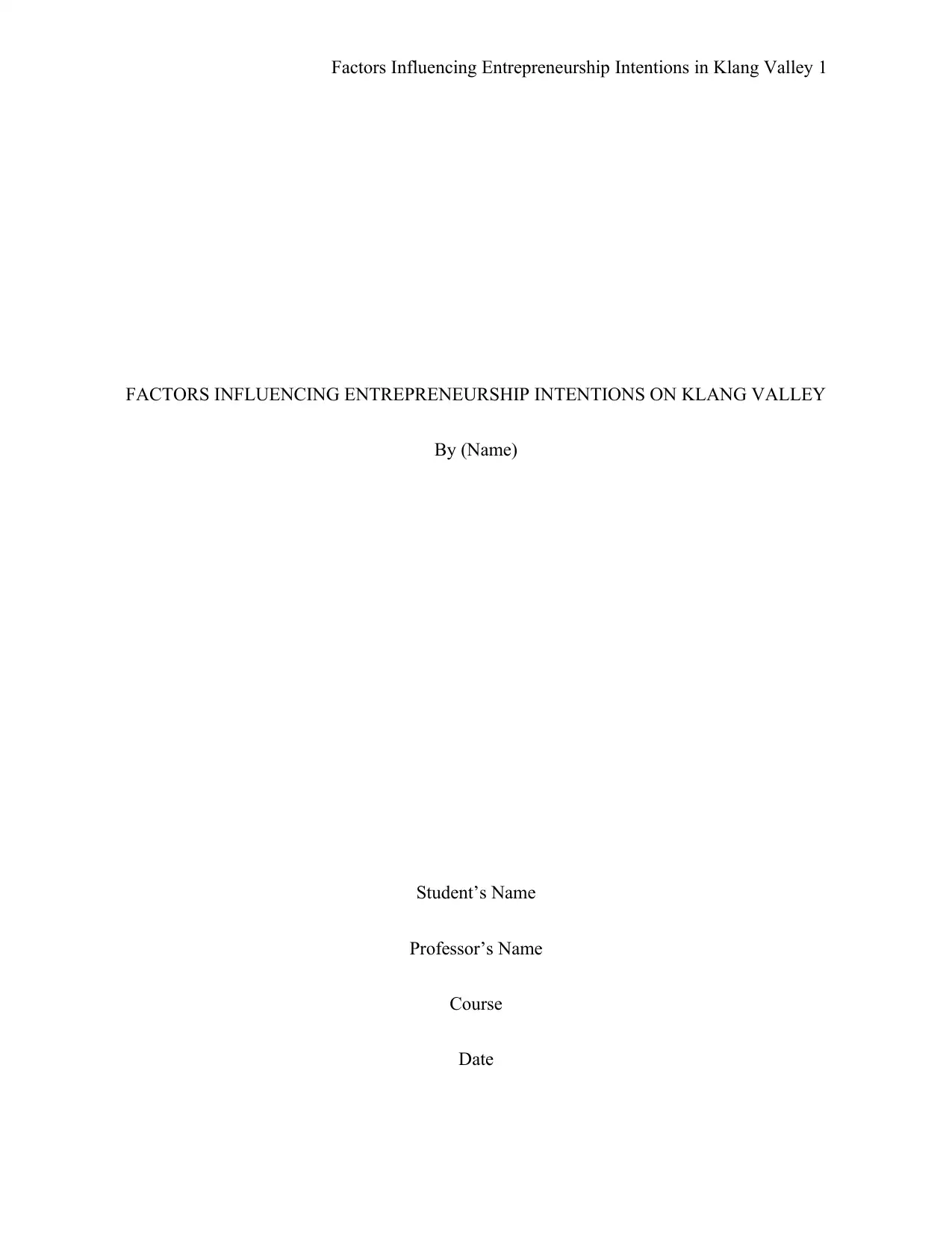
Factors Influencing Entrepreneurship Intentions in Klang Valley 1
FACTORS INFLUENCING ENTREPRENEURSHIP INTENTIONS ON KLANG VALLEY
By (Name)
Student’s Name
Professor’s Name
Course
Date
FACTORS INFLUENCING ENTREPRENEURSHIP INTENTIONS ON KLANG VALLEY
By (Name)
Student’s Name
Professor’s Name
Course
Date
Paraphrase This Document
Need a fresh take? Get an instant paraphrase of this document with our AI Paraphraser
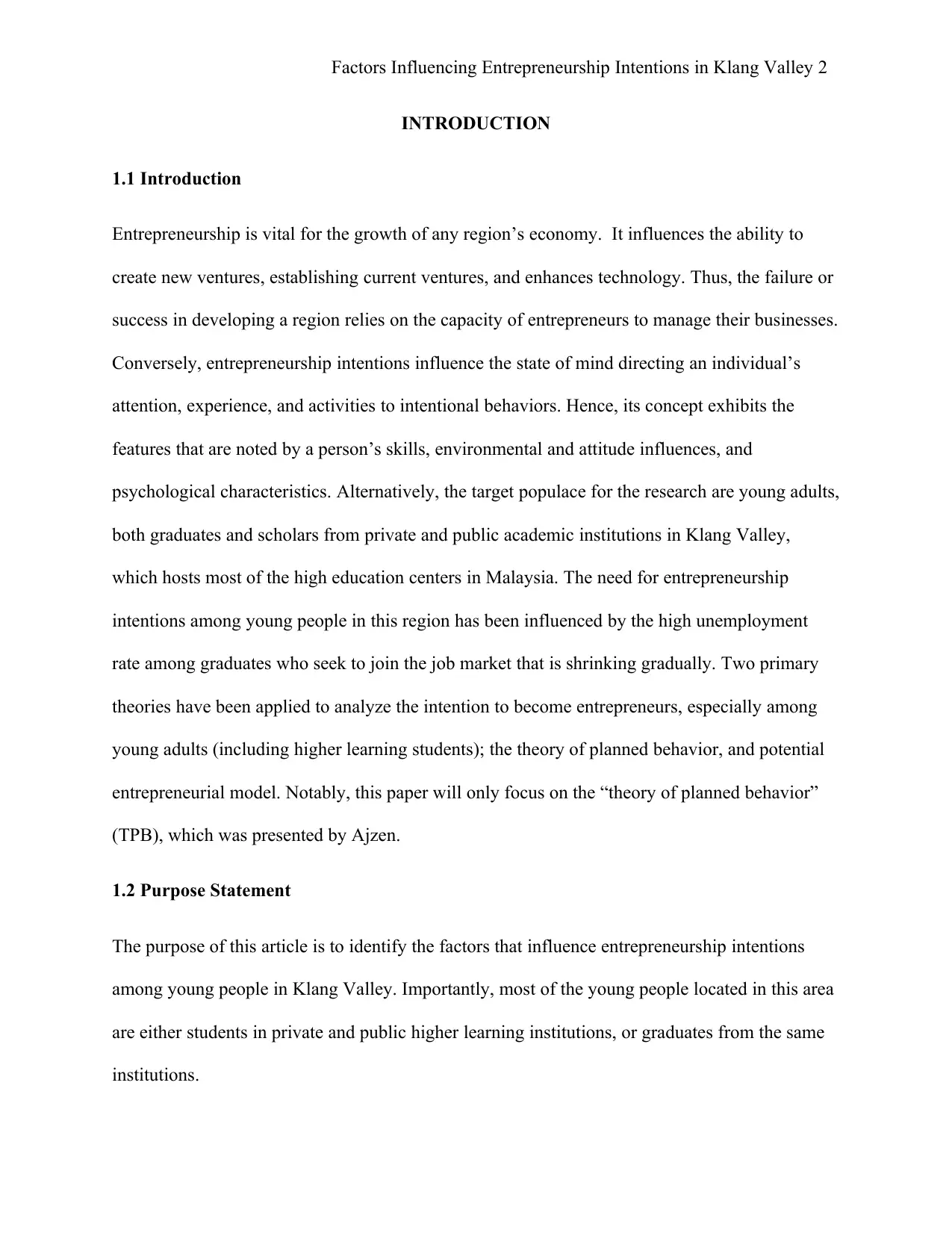
Factors Influencing Entrepreneurship Intentions in Klang Valley 2
INTRODUCTION
1.1 Introduction
Entrepreneurship is vital for the growth of any region’s economy. It influences the ability to
create new ventures, establishing current ventures, and enhances technology. Thus, the failure or
success in developing a region relies on the capacity of entrepreneurs to manage their businesses.
Conversely, entrepreneurship intentions influence the state of mind directing an individual’s
attention, experience, and activities to intentional behaviors. Hence, its concept exhibits the
features that are noted by a person’s skills, environmental and attitude influences, and
psychological characteristics. Alternatively, the target populace for the research are young adults,
both graduates and scholars from private and public academic institutions in Klang Valley,
which hosts most of the high education centers in Malaysia. The need for entrepreneurship
intentions among young people in this region has been influenced by the high unemployment
rate among graduates who seek to join the job market that is shrinking gradually. Two primary
theories have been applied to analyze the intention to become entrepreneurs, especially among
young adults (including higher learning students); the theory of planned behavior, and potential
entrepreneurial model. Notably, this paper will only focus on the “theory of planned behavior”
(TPB), which was presented by Ajzen.
1.2 Purpose Statement
The purpose of this article is to identify the factors that influence entrepreneurship intentions
among young people in Klang Valley. Importantly, most of the young people located in this area
are either students in private and public higher learning institutions, or graduates from the same
institutions.
INTRODUCTION
1.1 Introduction
Entrepreneurship is vital for the growth of any region’s economy. It influences the ability to
create new ventures, establishing current ventures, and enhances technology. Thus, the failure or
success in developing a region relies on the capacity of entrepreneurs to manage their businesses.
Conversely, entrepreneurship intentions influence the state of mind directing an individual’s
attention, experience, and activities to intentional behaviors. Hence, its concept exhibits the
features that are noted by a person’s skills, environmental and attitude influences, and
psychological characteristics. Alternatively, the target populace for the research are young adults,
both graduates and scholars from private and public academic institutions in Klang Valley,
which hosts most of the high education centers in Malaysia. The need for entrepreneurship
intentions among young people in this region has been influenced by the high unemployment
rate among graduates who seek to join the job market that is shrinking gradually. Two primary
theories have been applied to analyze the intention to become entrepreneurs, especially among
young adults (including higher learning students); the theory of planned behavior, and potential
entrepreneurial model. Notably, this paper will only focus on the “theory of planned behavior”
(TPB), which was presented by Ajzen.
1.2 Purpose Statement
The purpose of this article is to identify the factors that influence entrepreneurship intentions
among young people in Klang Valley. Importantly, most of the young people located in this area
are either students in private and public higher learning institutions, or graduates from the same
institutions.
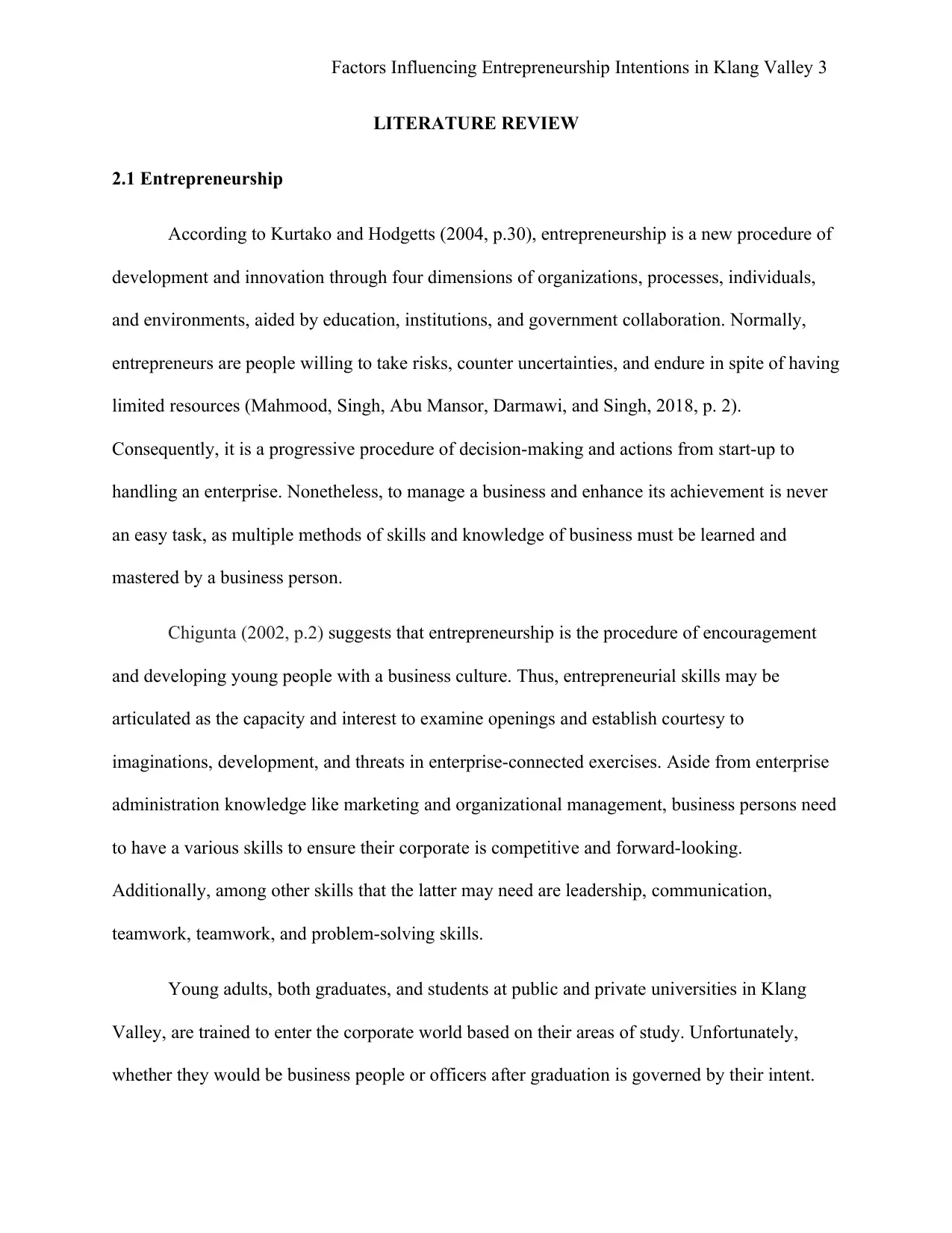
Factors Influencing Entrepreneurship Intentions in Klang Valley 3
LITERATURE REVIEW
2.1 Entrepreneurship
According to Kurtako and Hodgetts (2004, p.30), entrepreneurship is a new procedure of
development and innovation through four dimensions of organizations, processes, individuals,
and environments, aided by education, institutions, and government collaboration. Normally,
entrepreneurs are people willing to take risks, counter uncertainties, and endure in spite of having
limited resources (Mahmood, Singh, Abu Mansor, Darmawi, and Singh, 2018, p. 2).
Consequently, it is a progressive procedure of decision-making and actions from start-up to
handling an enterprise. Nonetheless, to manage a business and enhance its achievement is never
an easy task, as multiple methods of skills and knowledge of business must be learned and
mastered by a business person.
Chigunta (2002, p.2) suggests that entrepreneurship is the procedure of encouragement
and developing young people with a business culture. Thus, entrepreneurial skills may be
articulated as the capacity and interest to examine openings and establish courtesy to
imaginations, development, and threats in enterprise-connected exercises. Aside from enterprise
administration knowledge like marketing and organizational management, business persons need
to have a various skills to ensure their corporate is competitive and forward-looking.
Additionally, among other skills that the latter may need are leadership, communication,
teamwork, teamwork, and problem-solving skills.
Young adults, both graduates, and students at public and private universities in Klang
Valley, are trained to enter the corporate world based on their areas of study. Unfortunately,
whether they would be business people or officers after graduation is governed by their intent.
LITERATURE REVIEW
2.1 Entrepreneurship
According to Kurtako and Hodgetts (2004, p.30), entrepreneurship is a new procedure of
development and innovation through four dimensions of organizations, processes, individuals,
and environments, aided by education, institutions, and government collaboration. Normally,
entrepreneurs are people willing to take risks, counter uncertainties, and endure in spite of having
limited resources (Mahmood, Singh, Abu Mansor, Darmawi, and Singh, 2018, p. 2).
Consequently, it is a progressive procedure of decision-making and actions from start-up to
handling an enterprise. Nonetheless, to manage a business and enhance its achievement is never
an easy task, as multiple methods of skills and knowledge of business must be learned and
mastered by a business person.
Chigunta (2002, p.2) suggests that entrepreneurship is the procedure of encouragement
and developing young people with a business culture. Thus, entrepreneurial skills may be
articulated as the capacity and interest to examine openings and establish courtesy to
imaginations, development, and threats in enterprise-connected exercises. Aside from enterprise
administration knowledge like marketing and organizational management, business persons need
to have a various skills to ensure their corporate is competitive and forward-looking.
Additionally, among other skills that the latter may need are leadership, communication,
teamwork, teamwork, and problem-solving skills.
Young adults, both graduates, and students at public and private universities in Klang
Valley, are trained to enter the corporate world based on their areas of study. Unfortunately,
whether they would be business people or officers after graduation is governed by their intent.
You're viewing a preview
Unlock full access by subscribing today!
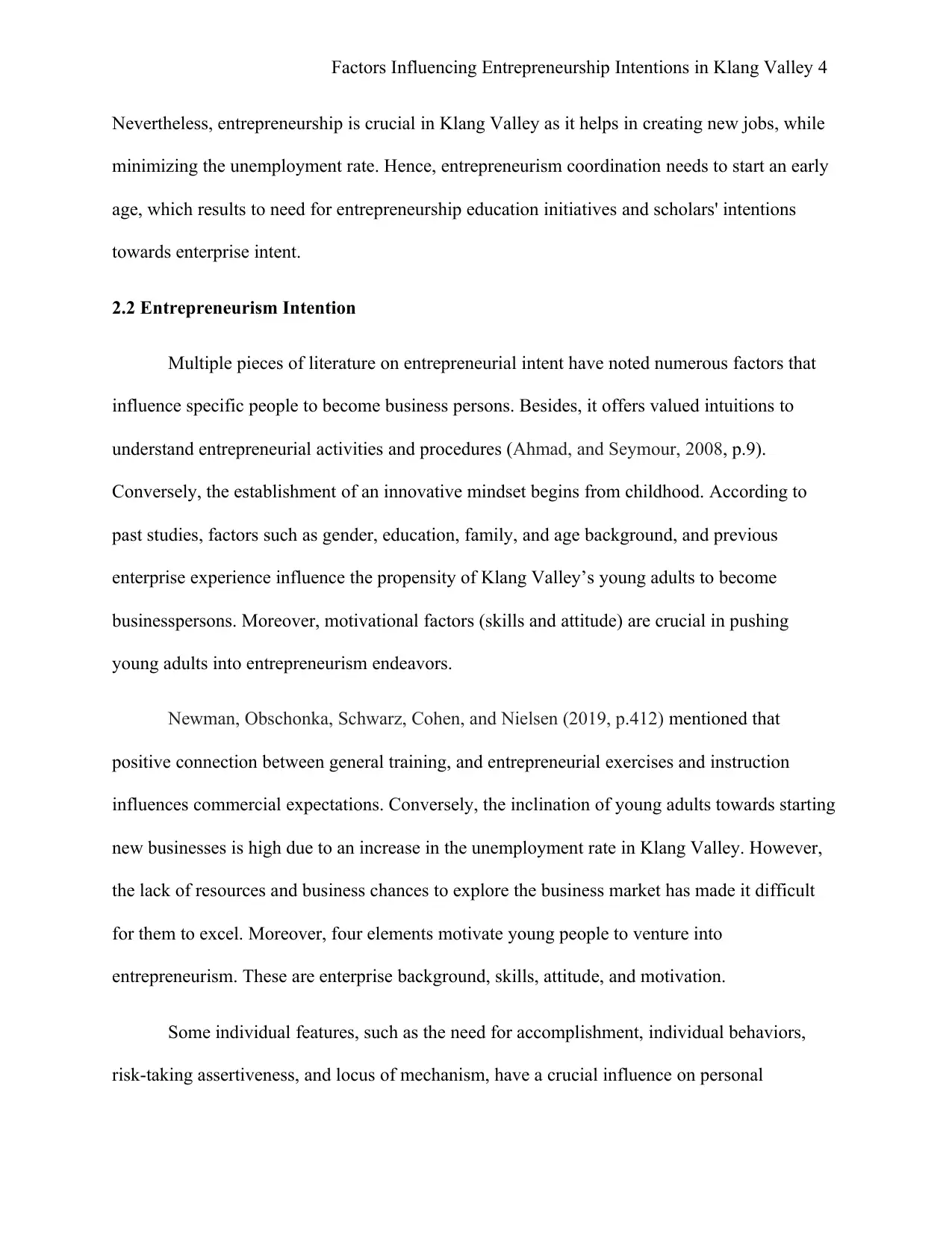
Factors Influencing Entrepreneurship Intentions in Klang Valley 4
Nevertheless, entrepreneurship is crucial in Klang Valley as it helps in creating new jobs, while
minimizing the unemployment rate. Hence, entrepreneurism coordination needs to start an early
age, which results to need for entrepreneurship education initiatives and scholars' intentions
towards enterprise intent.
2.2 Entrepreneurism Intention
Multiple pieces of literature on entrepreneurial intent have noted numerous factors that
influence specific people to become business persons. Besides, it offers valued intuitions to
understand entrepreneurial activities and procedures (Ahmad, and Seymour, 2008, p.9).
Conversely, the establishment of an innovative mindset begins from childhood. According to
past studies, factors such as gender, education, family, and age background, and previous
enterprise experience influence the propensity of Klang Valley’s young adults to become
businesspersons. Moreover, motivational factors (skills and attitude) are crucial in pushing
young adults into entrepreneurism endeavors.
Newman, Obschonka, Schwarz, Cohen, and Nielsen (2019, p.412) mentioned that
positive connection between general training, and entrepreneurial exercises and instruction
influences commercial expectations. Conversely, the inclination of young adults towards starting
new businesses is high due to an increase in the unemployment rate in Klang Valley. However,
the lack of resources and business chances to explore the business market has made it difficult
for them to excel. Moreover, four elements motivate young people to venture into
entrepreneurism. These are enterprise background, skills, attitude, and motivation.
Some individual features, such as the need for accomplishment, individual behaviors,
risk-taking assertiveness, and locus of mechanism, have a crucial influence on personal
Nevertheless, entrepreneurship is crucial in Klang Valley as it helps in creating new jobs, while
minimizing the unemployment rate. Hence, entrepreneurism coordination needs to start an early
age, which results to need for entrepreneurship education initiatives and scholars' intentions
towards enterprise intent.
2.2 Entrepreneurism Intention
Multiple pieces of literature on entrepreneurial intent have noted numerous factors that
influence specific people to become business persons. Besides, it offers valued intuitions to
understand entrepreneurial activities and procedures (Ahmad, and Seymour, 2008, p.9).
Conversely, the establishment of an innovative mindset begins from childhood. According to
past studies, factors such as gender, education, family, and age background, and previous
enterprise experience influence the propensity of Klang Valley’s young adults to become
businesspersons. Moreover, motivational factors (skills and attitude) are crucial in pushing
young adults into entrepreneurism endeavors.
Newman, Obschonka, Schwarz, Cohen, and Nielsen (2019, p.412) mentioned that
positive connection between general training, and entrepreneurial exercises and instruction
influences commercial expectations. Conversely, the inclination of young adults towards starting
new businesses is high due to an increase in the unemployment rate in Klang Valley. However,
the lack of resources and business chances to explore the business market has made it difficult
for them to excel. Moreover, four elements motivate young people to venture into
entrepreneurism. These are enterprise background, skills, attitude, and motivation.
Some individual features, such as the need for accomplishment, individual behaviors,
risk-taking assertiveness, and locus of mechanism, have a crucial influence on personal
Paraphrase This Document
Need a fresh take? Get an instant paraphrase of this document with our AI Paraphraser
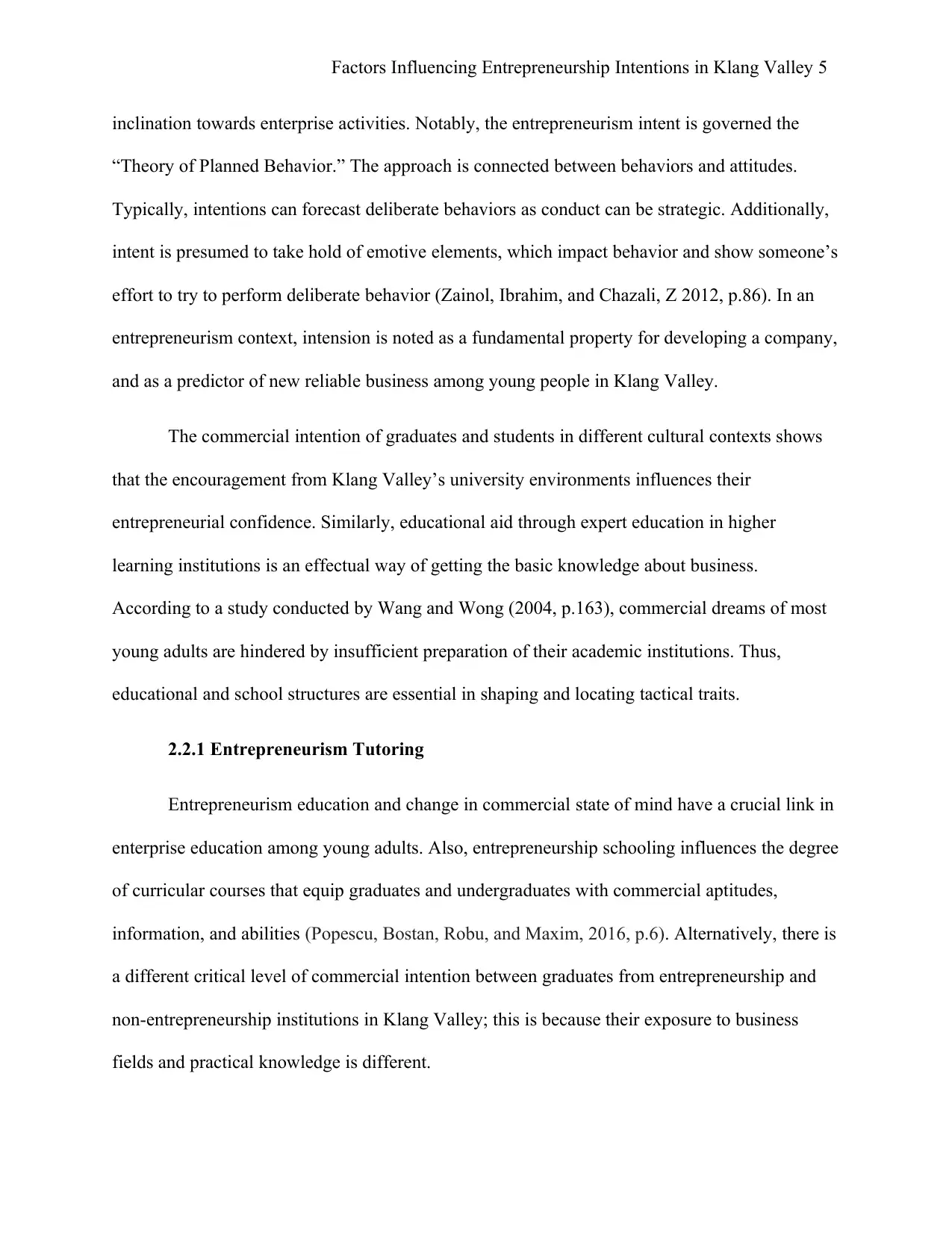
Factors Influencing Entrepreneurship Intentions in Klang Valley 5
inclination towards enterprise activities. Notably, the entrepreneurism intent is governed the
“Theory of Planned Behavior.” The approach is connected between behaviors and attitudes.
Typically, intentions can forecast deliberate behaviors as conduct can be strategic. Additionally,
intent is presumed to take hold of emotive elements, which impact behavior and show someone’s
effort to try to perform deliberate behavior (Zainol, Ibrahim, and Chazali, Z 2012, p.86). In an
entrepreneurism context, intension is noted as a fundamental property for developing a company,
and as a predictor of new reliable business among young people in Klang Valley.
The commercial intention of graduates and students in different cultural contexts shows
that the encouragement from Klang Valley’s university environments influences their
entrepreneurial confidence. Similarly, educational aid through expert education in higher
learning institutions is an effectual way of getting the basic knowledge about business.
According to a study conducted by Wang and Wong (2004, p.163), commercial dreams of most
young adults are hindered by insufficient preparation of their academic institutions. Thus,
educational and school structures are essential in shaping and locating tactical traits.
2.2.1 Entrepreneurism Tutoring
Entrepreneurism education and change in commercial state of mind have a crucial link in
enterprise education among young adults. Also, entrepreneurship schooling influences the degree
of curricular courses that equip graduates and undergraduates with commercial aptitudes,
information, and abilities (Popescu, Bostan, Robu, and Maxim, 2016, p.6). Alternatively, there is
a different critical level of commercial intention between graduates from entrepreneurship and
non-entrepreneurship institutions in Klang Valley; this is because their exposure to business
fields and practical knowledge is different.
inclination towards enterprise activities. Notably, the entrepreneurism intent is governed the
“Theory of Planned Behavior.” The approach is connected between behaviors and attitudes.
Typically, intentions can forecast deliberate behaviors as conduct can be strategic. Additionally,
intent is presumed to take hold of emotive elements, which impact behavior and show someone’s
effort to try to perform deliberate behavior (Zainol, Ibrahim, and Chazali, Z 2012, p.86). In an
entrepreneurism context, intension is noted as a fundamental property for developing a company,
and as a predictor of new reliable business among young people in Klang Valley.
The commercial intention of graduates and students in different cultural contexts shows
that the encouragement from Klang Valley’s university environments influences their
entrepreneurial confidence. Similarly, educational aid through expert education in higher
learning institutions is an effectual way of getting the basic knowledge about business.
According to a study conducted by Wang and Wong (2004, p.163), commercial dreams of most
young adults are hindered by insufficient preparation of their academic institutions. Thus,
educational and school structures are essential in shaping and locating tactical traits.
2.2.1 Entrepreneurism Tutoring
Entrepreneurism education and change in commercial state of mind have a crucial link in
enterprise education among young adults. Also, entrepreneurship schooling influences the degree
of curricular courses that equip graduates and undergraduates with commercial aptitudes,
information, and abilities (Popescu, Bostan, Robu, and Maxim, 2016, p.6). Alternatively, there is
a different critical level of commercial intention between graduates from entrepreneurship and
non-entrepreneurship institutions in Klang Valley; this is because their exposure to business
fields and practical knowledge is different.
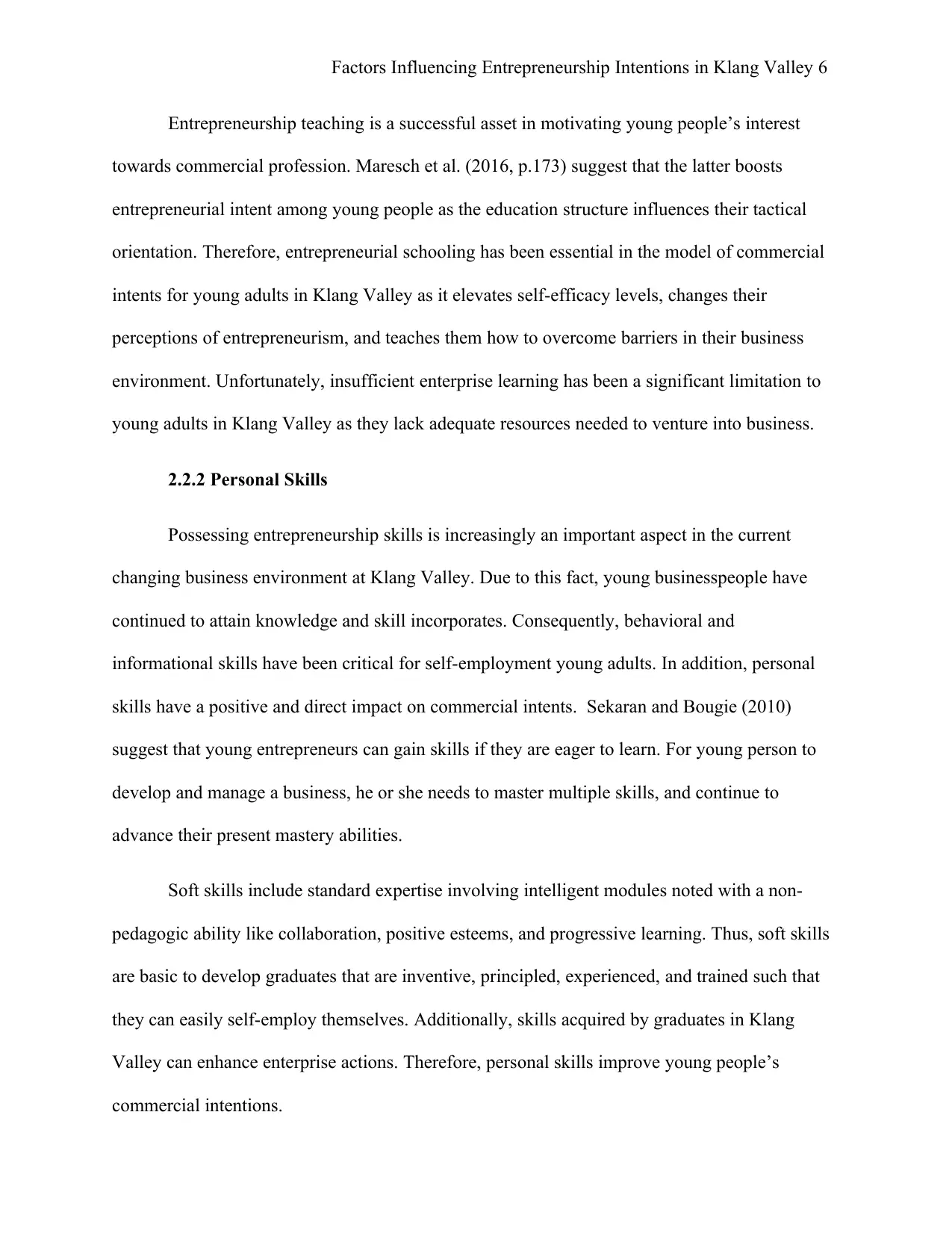
Factors Influencing Entrepreneurship Intentions in Klang Valley 6
Entrepreneurship teaching is a successful asset in motivating young people’s interest
towards commercial profession. Maresch et al. (2016, p.173) suggest that the latter boosts
entrepreneurial intent among young people as the education structure influences their tactical
orientation. Therefore, entrepreneurial schooling has been essential in the model of commercial
intents for young adults in Klang Valley as it elevates self-efficacy levels, changes their
perceptions of entrepreneurism, and teaches them how to overcome barriers in their business
environment. Unfortunately, insufficient enterprise learning has been a significant limitation to
young adults in Klang Valley as they lack adequate resources needed to venture into business.
2.2.2 Personal Skills
Possessing entrepreneurship skills is increasingly an important aspect in the current
changing business environment at Klang Valley. Due to this fact, young businesspeople have
continued to attain knowledge and skill incorporates. Consequently, behavioral and
informational skills have been critical for self-employment young adults. In addition, personal
skills have a positive and direct impact on commercial intents. Sekaran and Bougie (2010)
suggest that young entrepreneurs can gain skills if they are eager to learn. For young person to
develop and manage a business, he or she needs to master multiple skills, and continue to
advance their present mastery abilities.
Soft skills include standard expertise involving intelligent modules noted with a non-
pedagogic ability like collaboration, positive esteems, and progressive learning. Thus, soft skills
are basic to develop graduates that are inventive, principled, experienced, and trained such that
they can easily self-employ themselves. Additionally, skills acquired by graduates in Klang
Valley can enhance enterprise actions. Therefore, personal skills improve young people’s
commercial intentions.
Entrepreneurship teaching is a successful asset in motivating young people’s interest
towards commercial profession. Maresch et al. (2016, p.173) suggest that the latter boosts
entrepreneurial intent among young people as the education structure influences their tactical
orientation. Therefore, entrepreneurial schooling has been essential in the model of commercial
intents for young adults in Klang Valley as it elevates self-efficacy levels, changes their
perceptions of entrepreneurism, and teaches them how to overcome barriers in their business
environment. Unfortunately, insufficient enterprise learning has been a significant limitation to
young adults in Klang Valley as they lack adequate resources needed to venture into business.
2.2.2 Personal Skills
Possessing entrepreneurship skills is increasingly an important aspect in the current
changing business environment at Klang Valley. Due to this fact, young businesspeople have
continued to attain knowledge and skill incorporates. Consequently, behavioral and
informational skills have been critical for self-employment young adults. In addition, personal
skills have a positive and direct impact on commercial intents. Sekaran and Bougie (2010)
suggest that young entrepreneurs can gain skills if they are eager to learn. For young person to
develop and manage a business, he or she needs to master multiple skills, and continue to
advance their present mastery abilities.
Soft skills include standard expertise involving intelligent modules noted with a non-
pedagogic ability like collaboration, positive esteems, and progressive learning. Thus, soft skills
are basic to develop graduates that are inventive, principled, experienced, and trained such that
they can easily self-employ themselves. Additionally, skills acquired by graduates in Klang
Valley can enhance enterprise actions. Therefore, personal skills improve young people’s
commercial intentions.
You're viewing a preview
Unlock full access by subscribing today!
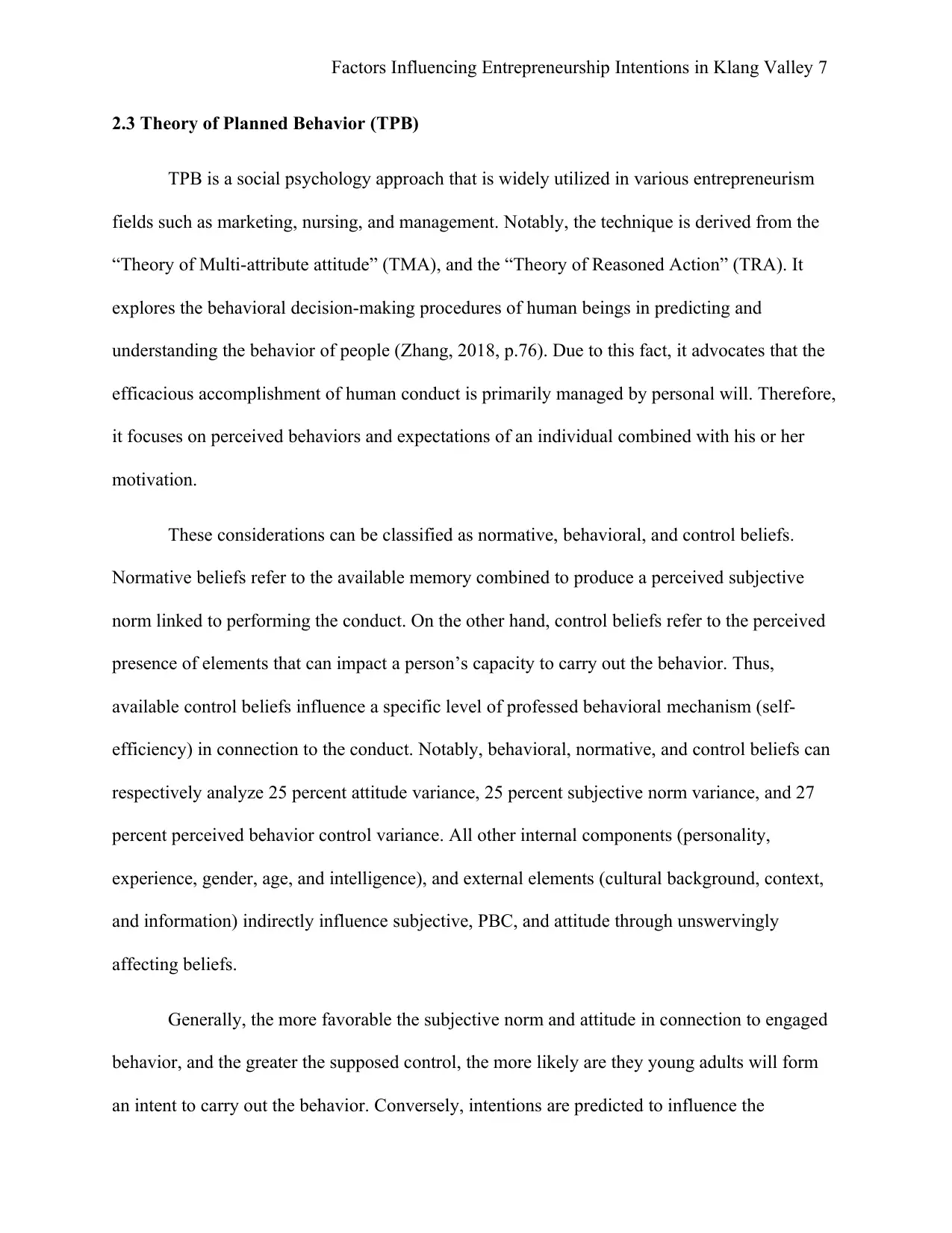
Factors Influencing Entrepreneurship Intentions in Klang Valley 7
2.3 Theory of Planned Behavior (TPB)
TPB is a social psychology approach that is widely utilized in various entrepreneurism
fields such as marketing, nursing, and management. Notably, the technique is derived from the
“Theory of Multi-attribute attitude” (TMA), and the “Theory of Reasoned Action” (TRA). It
explores the behavioral decision-making procedures of human beings in predicting and
understanding the behavior of people (Zhang, 2018, p.76). Due to this fact, it advocates that the
efficacious accomplishment of human conduct is primarily managed by personal will. Therefore,
it focuses on perceived behaviors and expectations of an individual combined with his or her
motivation.
These considerations can be classified as normative, behavioral, and control beliefs.
Normative beliefs refer to the available memory combined to produce a perceived subjective
norm linked to performing the conduct. On the other hand, control beliefs refer to the perceived
presence of elements that can impact a person’s capacity to carry out the behavior. Thus,
available control beliefs influence a specific level of professed behavioral mechanism (self-
efficiency) in connection to the conduct. Notably, behavioral, normative, and control beliefs can
respectively analyze 25 percent attitude variance, 25 percent subjective norm variance, and 27
percent perceived behavior control variance. All other internal components (personality,
experience, gender, age, and intelligence), and external elements (cultural background, context,
and information) indirectly influence subjective, PBC, and attitude through unswervingly
affecting beliefs.
Generally, the more favorable the subjective norm and attitude in connection to engaged
behavior, and the greater the supposed control, the more likely are they young adults will form
an intent to carry out the behavior. Conversely, intentions are predicted to influence the
2.3 Theory of Planned Behavior (TPB)
TPB is a social psychology approach that is widely utilized in various entrepreneurism
fields such as marketing, nursing, and management. Notably, the technique is derived from the
“Theory of Multi-attribute attitude” (TMA), and the “Theory of Reasoned Action” (TRA). It
explores the behavioral decision-making procedures of human beings in predicting and
understanding the behavior of people (Zhang, 2018, p.76). Due to this fact, it advocates that the
efficacious accomplishment of human conduct is primarily managed by personal will. Therefore,
it focuses on perceived behaviors and expectations of an individual combined with his or her
motivation.
These considerations can be classified as normative, behavioral, and control beliefs.
Normative beliefs refer to the available memory combined to produce a perceived subjective
norm linked to performing the conduct. On the other hand, control beliefs refer to the perceived
presence of elements that can impact a person’s capacity to carry out the behavior. Thus,
available control beliefs influence a specific level of professed behavioral mechanism (self-
efficiency) in connection to the conduct. Notably, behavioral, normative, and control beliefs can
respectively analyze 25 percent attitude variance, 25 percent subjective norm variance, and 27
percent perceived behavior control variance. All other internal components (personality,
experience, gender, age, and intelligence), and external elements (cultural background, context,
and information) indirectly influence subjective, PBC, and attitude through unswervingly
affecting beliefs.
Generally, the more favorable the subjective norm and attitude in connection to engaged
behavior, and the greater the supposed control, the more likely are they young adults will form
an intent to carry out the behavior. Conversely, intentions are predicted to influence the
Paraphrase This Document
Need a fresh take? Get an instant paraphrase of this document with our AI Paraphraser
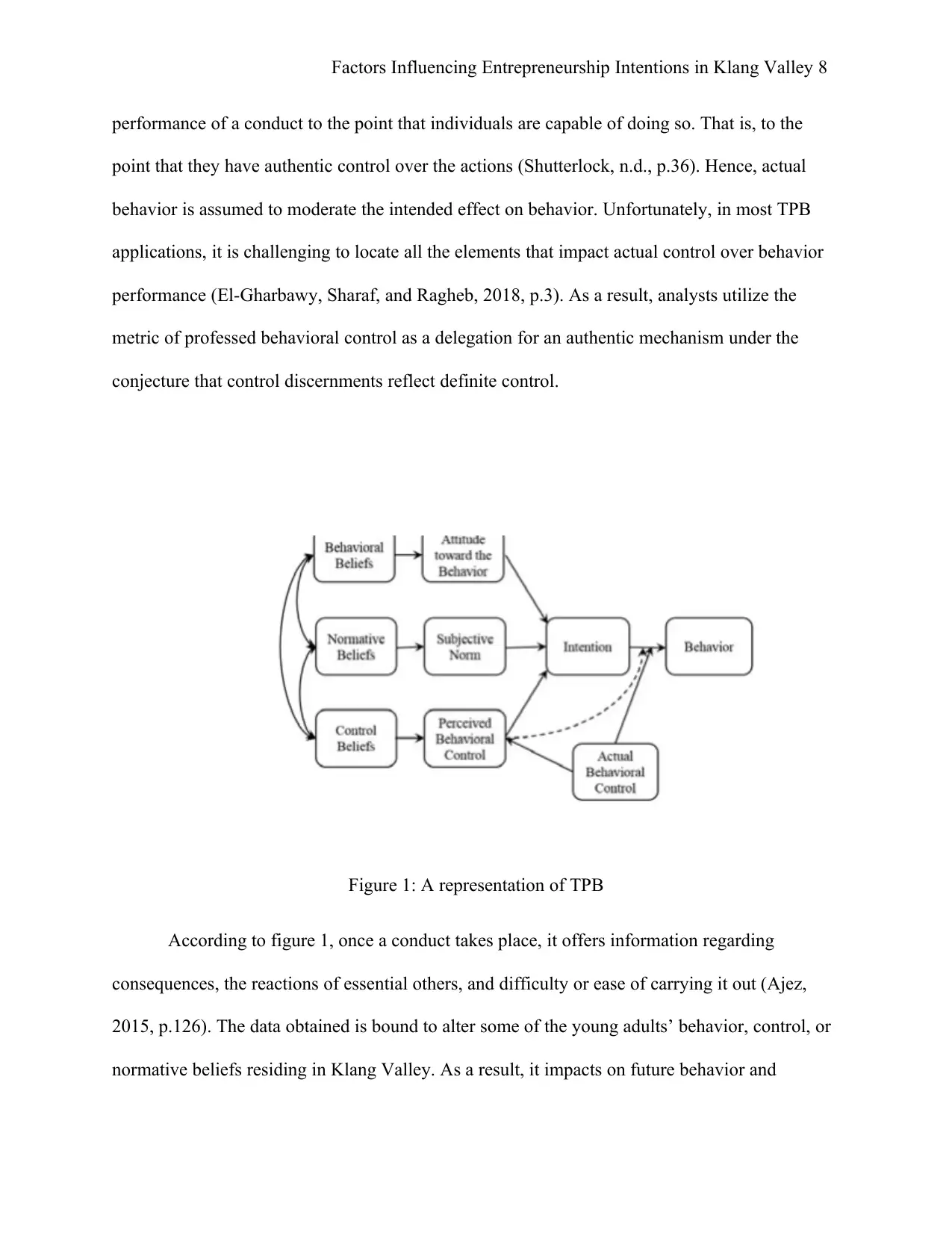
Factors Influencing Entrepreneurship Intentions in Klang Valley 8
performance of a conduct to the point that individuals are capable of doing so. That is, to the
point that they have authentic control over the actions (Shutterlock, n.d., p.36). Hence, actual
behavior is assumed to moderate the intended effect on behavior. Unfortunately, in most TPB
applications, it is challenging to locate all the elements that impact actual control over behavior
performance (El-Gharbawy, Sharaf, and Ragheb, 2018, p.3). As a result, analysts utilize the
metric of professed behavioral control as a delegation for an authentic mechanism under the
conjecture that control discernments reflect definite control.
Figure 1: A representation of TPB
According to figure 1, once a conduct takes place, it offers information regarding
consequences, the reactions of essential others, and difficulty or ease of carrying it out (Ajez,
2015, p.126). The data obtained is bound to alter some of the young adults’ behavior, control, or
normative beliefs residing in Klang Valley. As a result, it impacts on future behavior and
performance of a conduct to the point that individuals are capable of doing so. That is, to the
point that they have authentic control over the actions (Shutterlock, n.d., p.36). Hence, actual
behavior is assumed to moderate the intended effect on behavior. Unfortunately, in most TPB
applications, it is challenging to locate all the elements that impact actual control over behavior
performance (El-Gharbawy, Sharaf, and Ragheb, 2018, p.3). As a result, analysts utilize the
metric of professed behavioral control as a delegation for an authentic mechanism under the
conjecture that control discernments reflect definite control.
Figure 1: A representation of TPB
According to figure 1, once a conduct takes place, it offers information regarding
consequences, the reactions of essential others, and difficulty or ease of carrying it out (Ajez,
2015, p.126). The data obtained is bound to alter some of the young adults’ behavior, control, or
normative beliefs residing in Klang Valley. As a result, it impacts on future behavior and
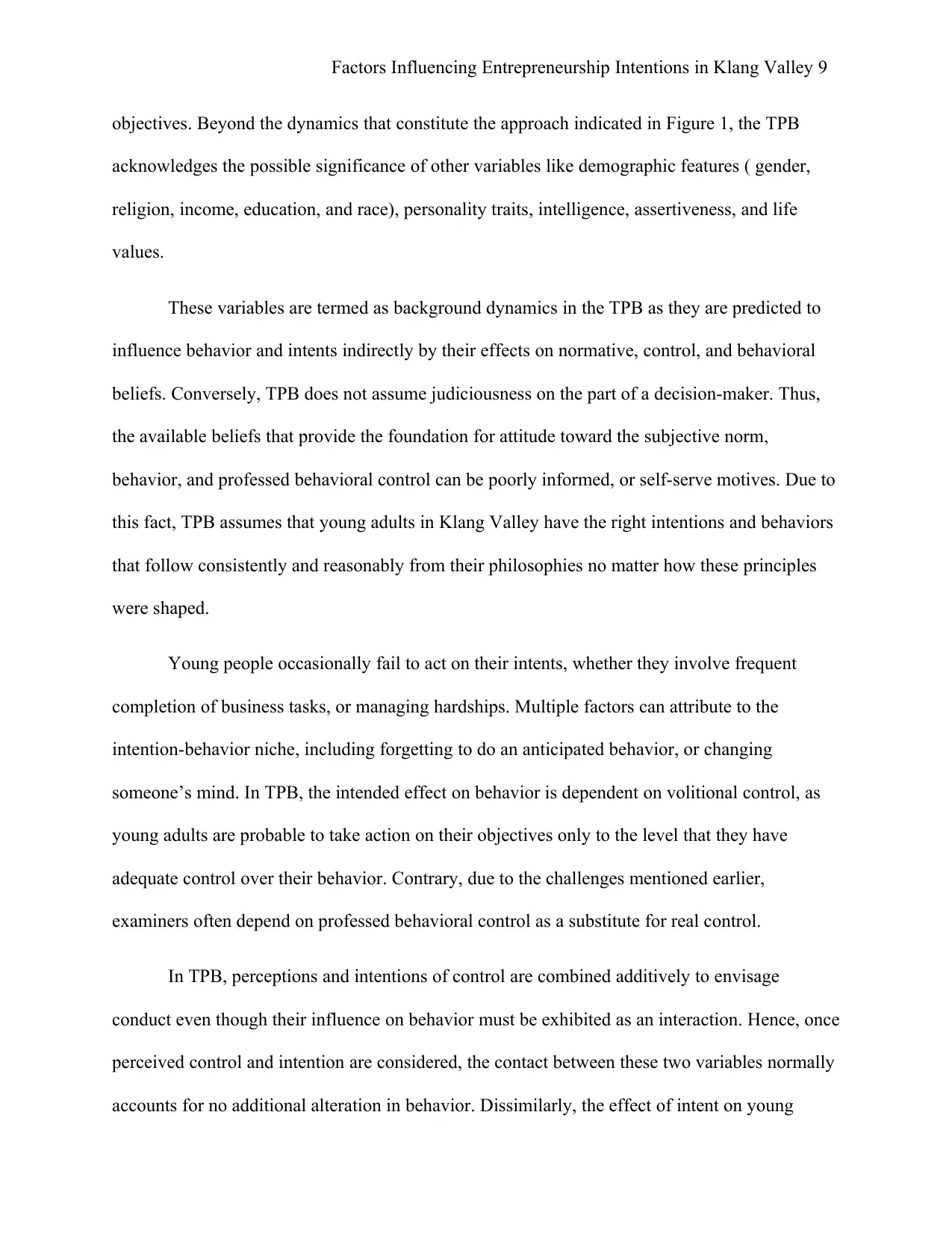
Factors Influencing Entrepreneurship Intentions in Klang Valley 9
objectives. Beyond the dynamics that constitute the approach indicated in Figure 1, the TPB
acknowledges the possible significance of other variables like demographic features ( gender,
religion, income, education, and race), personality traits, intelligence, assertiveness, and life
values.
These variables are termed as background dynamics in the TPB as they are predicted to
influence behavior and intents indirectly by their effects on normative, control, and behavioral
beliefs. Conversely, TPB does not assume judiciousness on the part of a decision-maker. Thus,
the available beliefs that provide the foundation for attitude toward the subjective norm,
behavior, and professed behavioral control can be poorly informed, or self-serve motives. Due to
this fact, TPB assumes that young adults in Klang Valley have the right intentions and behaviors
that follow consistently and reasonably from their philosophies no matter how these principles
were shaped.
Young people occasionally fail to act on their intents, whether they involve frequent
completion of business tasks, or managing hardships. Multiple factors can attribute to the
intention-behavior niche, including forgetting to do an anticipated behavior, or changing
someone’s mind. In TPB, the intended effect on behavior is dependent on volitional control, as
young adults are probable to take action on their objectives only to the level that they have
adequate control over their behavior. Contrary, due to the challenges mentioned earlier,
examiners often depend on professed behavioral control as a substitute for real control.
In TPB, perceptions and intentions of control are combined additively to envisage
conduct even though their influence on behavior must be exhibited as an interaction. Hence, once
perceived control and intention are considered, the contact between these two variables normally
accounts for no additional alteration in behavior. Dissimilarly, the effect of intent on young
objectives. Beyond the dynamics that constitute the approach indicated in Figure 1, the TPB
acknowledges the possible significance of other variables like demographic features ( gender,
religion, income, education, and race), personality traits, intelligence, assertiveness, and life
values.
These variables are termed as background dynamics in the TPB as they are predicted to
influence behavior and intents indirectly by their effects on normative, control, and behavioral
beliefs. Conversely, TPB does not assume judiciousness on the part of a decision-maker. Thus,
the available beliefs that provide the foundation for attitude toward the subjective norm,
behavior, and professed behavioral control can be poorly informed, or self-serve motives. Due to
this fact, TPB assumes that young adults in Klang Valley have the right intentions and behaviors
that follow consistently and reasonably from their philosophies no matter how these principles
were shaped.
Young people occasionally fail to act on their intents, whether they involve frequent
completion of business tasks, or managing hardships. Multiple factors can attribute to the
intention-behavior niche, including forgetting to do an anticipated behavior, or changing
someone’s mind. In TPB, the intended effect on behavior is dependent on volitional control, as
young adults are probable to take action on their objectives only to the level that they have
adequate control over their behavior. Contrary, due to the challenges mentioned earlier,
examiners often depend on professed behavioral control as a substitute for real control.
In TPB, perceptions and intentions of control are combined additively to envisage
conduct even though their influence on behavior must be exhibited as an interaction. Hence, once
perceived control and intention are considered, the contact between these two variables normally
accounts for no additional alteration in behavior. Dissimilarly, the effect of intent on young
You're viewing a preview
Unlock full access by subscribing today!
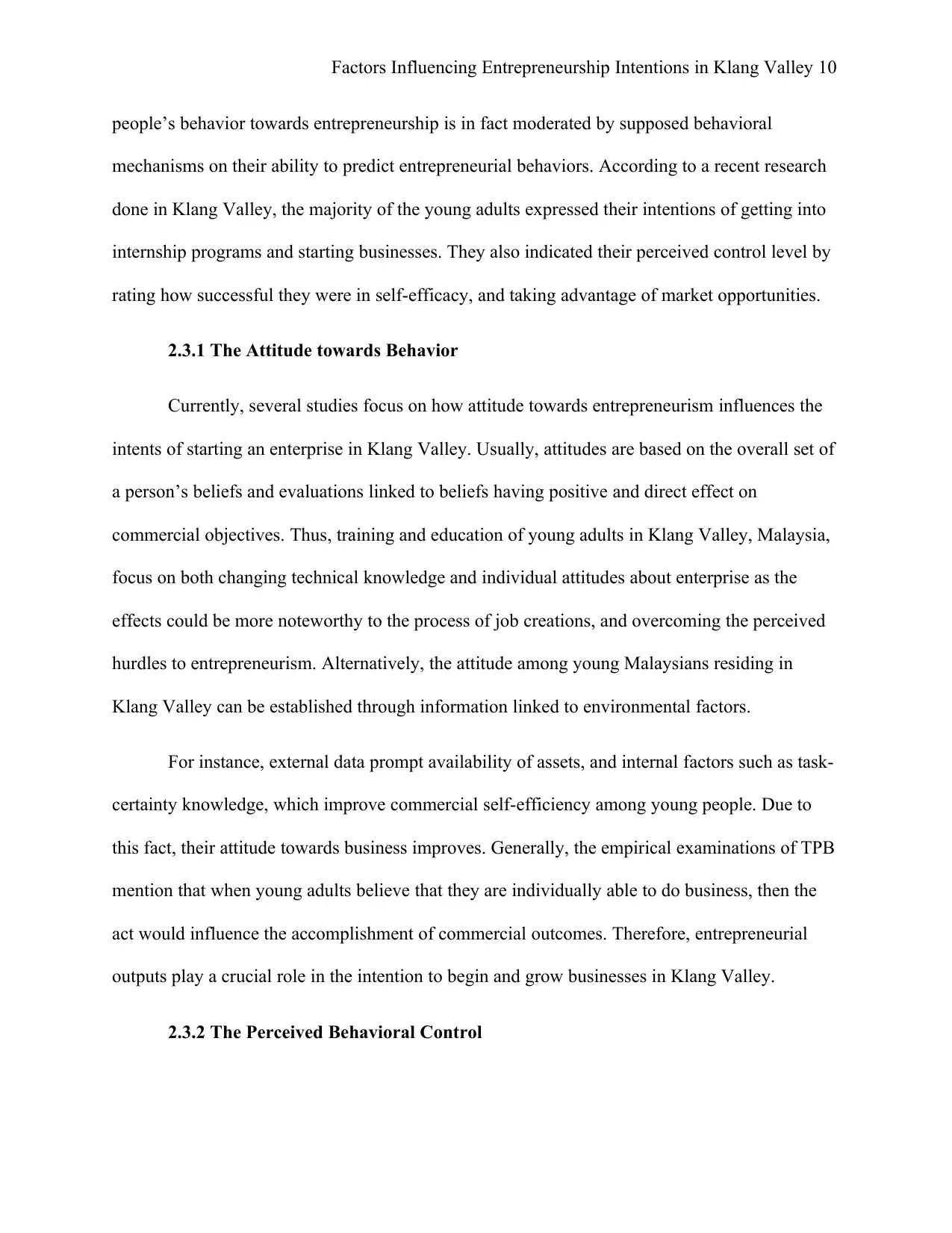
Factors Influencing Entrepreneurship Intentions in Klang Valley 10
people’s behavior towards entrepreneurship is in fact moderated by supposed behavioral
mechanisms on their ability to predict entrepreneurial behaviors. According to a recent research
done in Klang Valley, the majority of the young adults expressed their intentions of getting into
internship programs and starting businesses. They also indicated their perceived control level by
rating how successful they were in self-efficacy, and taking advantage of market opportunities.
2.3.1 The Attitude towards Behavior
Currently, several studies focus on how attitude towards entrepreneurism influences the
intents of starting an enterprise in Klang Valley. Usually, attitudes are based on the overall set of
a person’s beliefs and evaluations linked to beliefs having positive and direct effect on
commercial objectives. Thus, training and education of young adults in Klang Valley, Malaysia,
focus on both changing technical knowledge and individual attitudes about enterprise as the
effects could be more noteworthy to the process of job creations, and overcoming the perceived
hurdles to entrepreneurism. Alternatively, the attitude among young Malaysians residing in
Klang Valley can be established through information linked to environmental factors.
For instance, external data prompt availability of assets, and internal factors such as task-
certainty knowledge, which improve commercial self-efficiency among young people. Due to
this fact, their attitude towards business improves. Generally, the empirical examinations of TPB
mention that when young adults believe that they are individually able to do business, then the
act would influence the accomplishment of commercial outcomes. Therefore, entrepreneurial
outputs play a crucial role in the intention to begin and grow businesses in Klang Valley.
2.3.2 The Perceived Behavioral Control
people’s behavior towards entrepreneurship is in fact moderated by supposed behavioral
mechanisms on their ability to predict entrepreneurial behaviors. According to a recent research
done in Klang Valley, the majority of the young adults expressed their intentions of getting into
internship programs and starting businesses. They also indicated their perceived control level by
rating how successful they were in self-efficacy, and taking advantage of market opportunities.
2.3.1 The Attitude towards Behavior
Currently, several studies focus on how attitude towards entrepreneurism influences the
intents of starting an enterprise in Klang Valley. Usually, attitudes are based on the overall set of
a person’s beliefs and evaluations linked to beliefs having positive and direct effect on
commercial objectives. Thus, training and education of young adults in Klang Valley, Malaysia,
focus on both changing technical knowledge and individual attitudes about enterprise as the
effects could be more noteworthy to the process of job creations, and overcoming the perceived
hurdles to entrepreneurism. Alternatively, the attitude among young Malaysians residing in
Klang Valley can be established through information linked to environmental factors.
For instance, external data prompt availability of assets, and internal factors such as task-
certainty knowledge, which improve commercial self-efficiency among young people. Due to
this fact, their attitude towards business improves. Generally, the empirical examinations of TPB
mention that when young adults believe that they are individually able to do business, then the
act would influence the accomplishment of commercial outcomes. Therefore, entrepreneurial
outputs play a crucial role in the intention to begin and grow businesses in Klang Valley.
2.3.2 The Perceived Behavioral Control
Paraphrase This Document
Need a fresh take? Get an instant paraphrase of this document with our AI Paraphraser
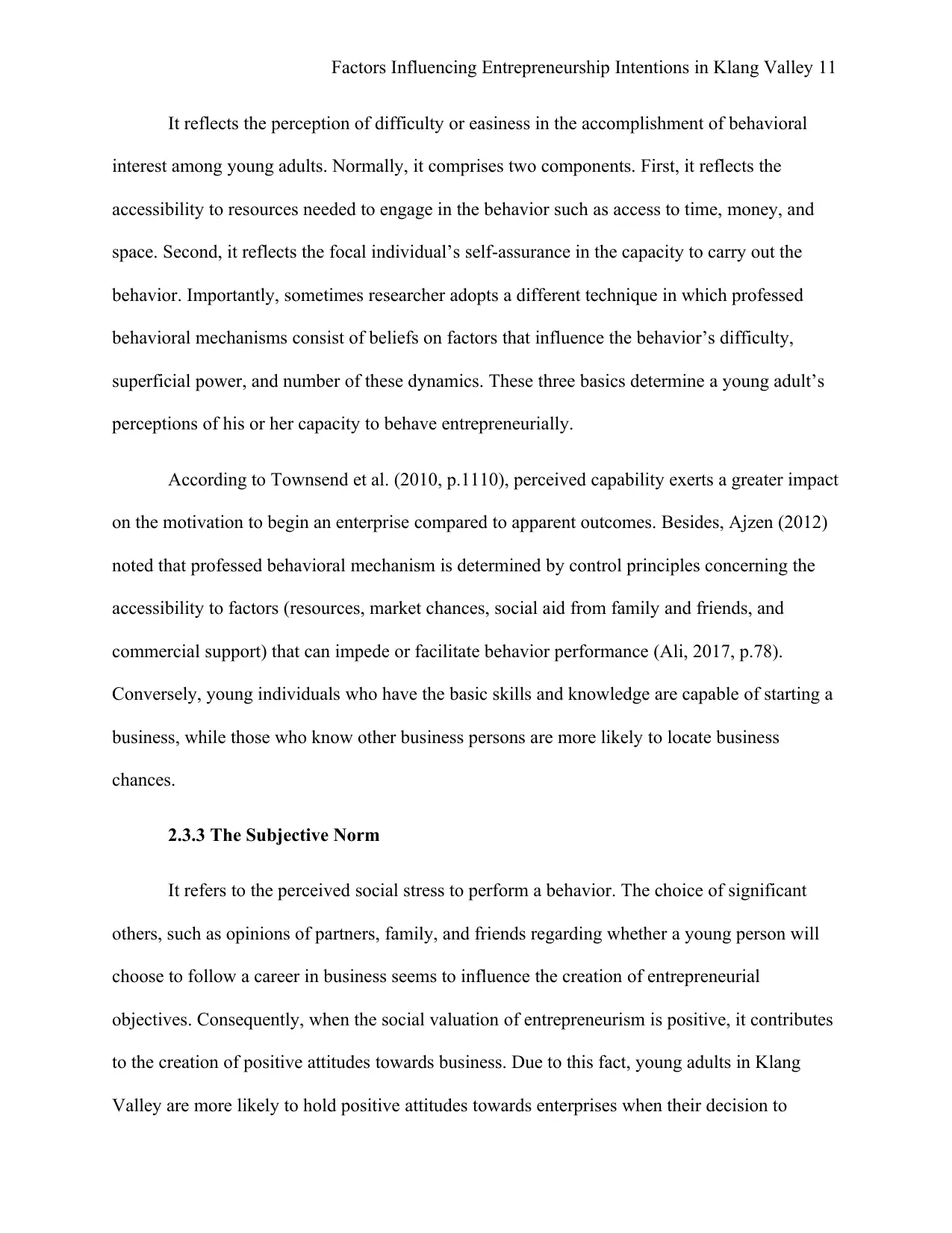
Factors Influencing Entrepreneurship Intentions in Klang Valley 11
It reflects the perception of difficulty or easiness in the accomplishment of behavioral
interest among young adults. Normally, it comprises two components. First, it reflects the
accessibility to resources needed to engage in the behavior such as access to time, money, and
space. Second, it reflects the focal individual’s self-assurance in the capacity to carry out the
behavior. Importantly, sometimes researcher adopts a different technique in which professed
behavioral mechanisms consist of beliefs on factors that influence the behavior’s difficulty,
superficial power, and number of these dynamics. These three basics determine a young adult’s
perceptions of his or her capacity to behave entrepreneurially.
According to Townsend et al. (2010, p.1110), perceived capability exerts a greater impact
on the motivation to begin an enterprise compared to apparent outcomes. Besides, Ajzen (2012)
noted that professed behavioral mechanism is determined by control principles concerning the
accessibility to factors (resources, market chances, social aid from family and friends, and
commercial support) that can impede or facilitate behavior performance (Ali, 2017, p.78).
Conversely, young individuals who have the basic skills and knowledge are capable of starting a
business, while those who know other business persons are more likely to locate business
chances.
2.3.3 The Subjective Norm
It refers to the perceived social stress to perform a behavior. The choice of significant
others, such as opinions of partners, family, and friends regarding whether a young person will
choose to follow a career in business seems to influence the creation of entrepreneurial
objectives. Consequently, when the social valuation of entrepreneurism is positive, it contributes
to the creation of positive attitudes towards business. Due to this fact, young adults in Klang
Valley are more likely to hold positive attitudes towards enterprises when their decision to
It reflects the perception of difficulty or easiness in the accomplishment of behavioral
interest among young adults. Normally, it comprises two components. First, it reflects the
accessibility to resources needed to engage in the behavior such as access to time, money, and
space. Second, it reflects the focal individual’s self-assurance in the capacity to carry out the
behavior. Importantly, sometimes researcher adopts a different technique in which professed
behavioral mechanisms consist of beliefs on factors that influence the behavior’s difficulty,
superficial power, and number of these dynamics. These three basics determine a young adult’s
perceptions of his or her capacity to behave entrepreneurially.
According to Townsend et al. (2010, p.1110), perceived capability exerts a greater impact
on the motivation to begin an enterprise compared to apparent outcomes. Besides, Ajzen (2012)
noted that professed behavioral mechanism is determined by control principles concerning the
accessibility to factors (resources, market chances, social aid from family and friends, and
commercial support) that can impede or facilitate behavior performance (Ali, 2017, p.78).
Conversely, young individuals who have the basic skills and knowledge are capable of starting a
business, while those who know other business persons are more likely to locate business
chances.
2.3.3 The Subjective Norm
It refers to the perceived social stress to perform a behavior. The choice of significant
others, such as opinions of partners, family, and friends regarding whether a young person will
choose to follow a career in business seems to influence the creation of entrepreneurial
objectives. Consequently, when the social valuation of entrepreneurism is positive, it contributes
to the creation of positive attitudes towards business. Due to this fact, young adults in Klang
Valley are more likely to hold positive attitudes towards enterprises when their decision to
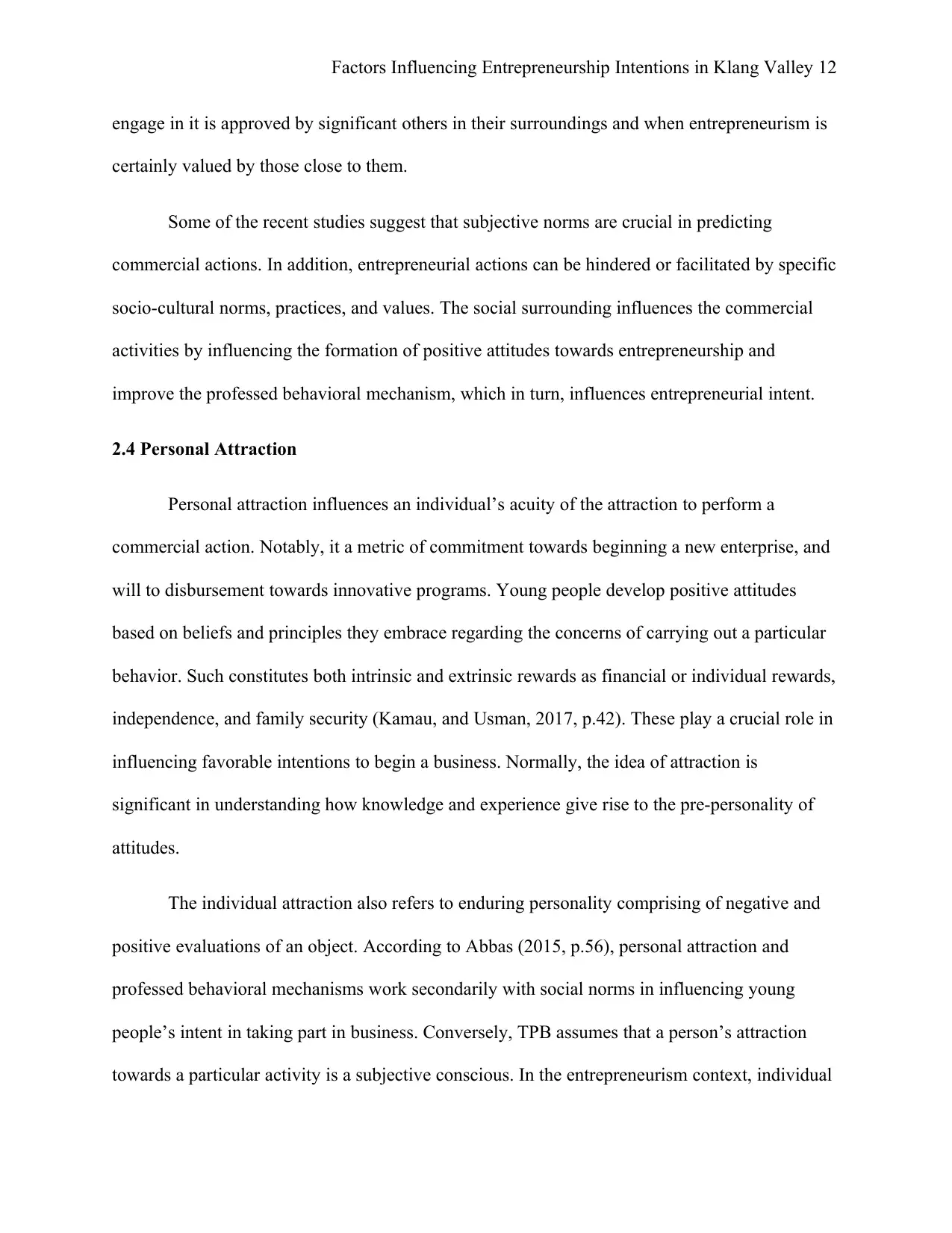
Factors Influencing Entrepreneurship Intentions in Klang Valley 12
engage in it is approved by significant others in their surroundings and when entrepreneurism is
certainly valued by those close to them.
Some of the recent studies suggest that subjective norms are crucial in predicting
commercial actions. In addition, entrepreneurial actions can be hindered or facilitated by specific
socio-cultural norms, practices, and values. The social surrounding influences the commercial
activities by influencing the formation of positive attitudes towards entrepreneurship and
improve the professed behavioral mechanism, which in turn, influences entrepreneurial intent.
2.4 Personal Attraction
Personal attraction influences an individual’s acuity of the attraction to perform a
commercial action. Notably, it a metric of commitment towards beginning a new enterprise, and
will to disbursement towards innovative programs. Young people develop positive attitudes
based on beliefs and principles they embrace regarding the concerns of carrying out a particular
behavior. Such constitutes both intrinsic and extrinsic rewards as financial or individual rewards,
independence, and family security (Kamau, and Usman, 2017, p.42). These play a crucial role in
influencing favorable intentions to begin a business. Normally, the idea of attraction is
significant in understanding how knowledge and experience give rise to the pre-personality of
attitudes.
The individual attraction also refers to enduring personality comprising of negative and
positive evaluations of an object. According to Abbas (2015, p.56), personal attraction and
professed behavioral mechanisms work secondarily with social norms in influencing young
people’s intent in taking part in business. Conversely, TPB assumes that a person’s attraction
towards a particular activity is a subjective conscious. In the entrepreneurism context, individual
engage in it is approved by significant others in their surroundings and when entrepreneurism is
certainly valued by those close to them.
Some of the recent studies suggest that subjective norms are crucial in predicting
commercial actions. In addition, entrepreneurial actions can be hindered or facilitated by specific
socio-cultural norms, practices, and values. The social surrounding influences the commercial
activities by influencing the formation of positive attitudes towards entrepreneurship and
improve the professed behavioral mechanism, which in turn, influences entrepreneurial intent.
2.4 Personal Attraction
Personal attraction influences an individual’s acuity of the attraction to perform a
commercial action. Notably, it a metric of commitment towards beginning a new enterprise, and
will to disbursement towards innovative programs. Young people develop positive attitudes
based on beliefs and principles they embrace regarding the concerns of carrying out a particular
behavior. Such constitutes both intrinsic and extrinsic rewards as financial or individual rewards,
independence, and family security (Kamau, and Usman, 2017, p.42). These play a crucial role in
influencing favorable intentions to begin a business. Normally, the idea of attraction is
significant in understanding how knowledge and experience give rise to the pre-personality of
attitudes.
The individual attraction also refers to enduring personality comprising of negative and
positive evaluations of an object. According to Abbas (2015, p.56), personal attraction and
professed behavioral mechanisms work secondarily with social norms in influencing young
people’s intent in taking part in business. Conversely, TPB assumes that a person’s attraction
towards a particular activity is a subjective conscious. In the entrepreneurism context, individual
You're viewing a preview
Unlock full access by subscribing today!
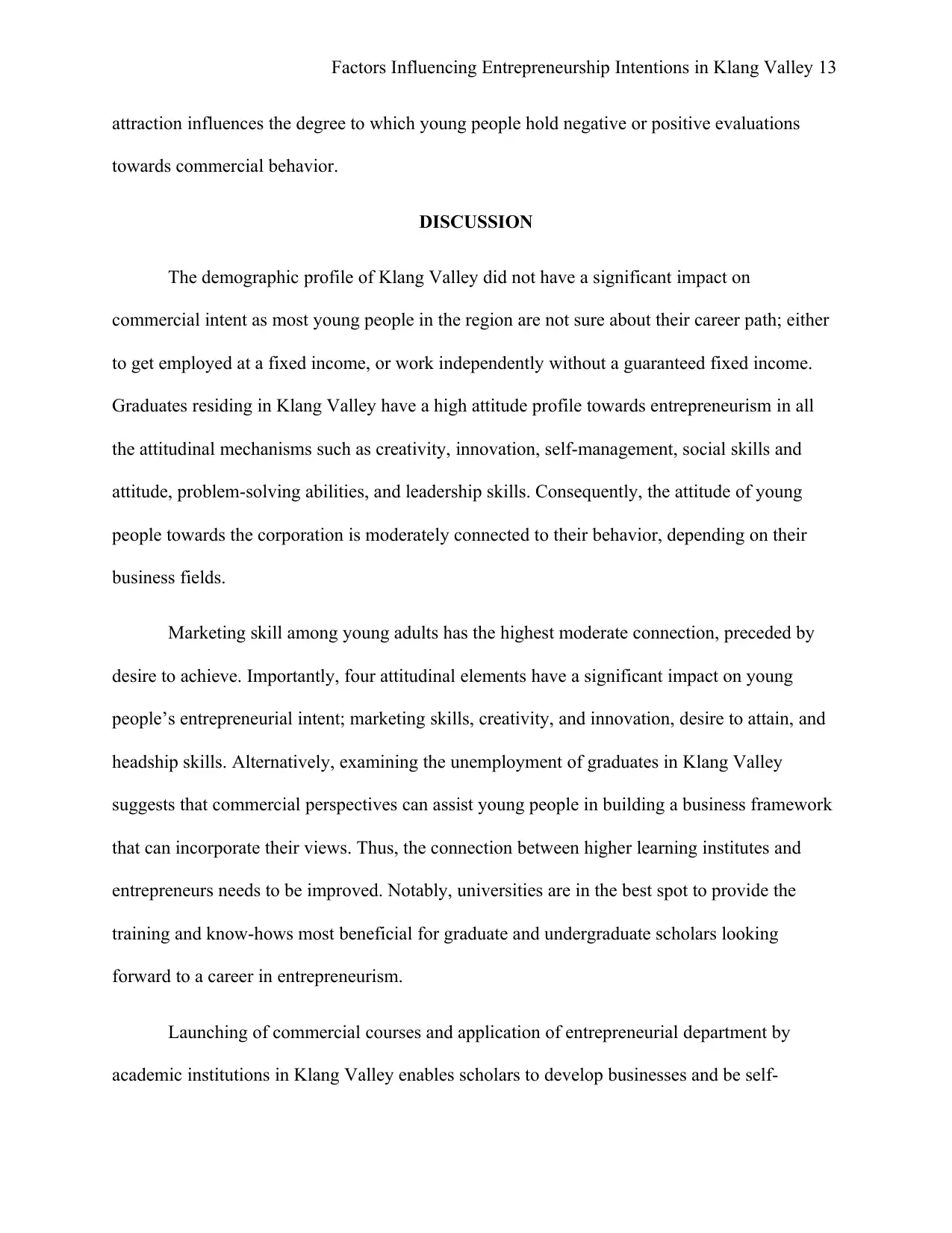
Factors Influencing Entrepreneurship Intentions in Klang Valley 13
attraction influences the degree to which young people hold negative or positive evaluations
towards commercial behavior.
DISCUSSION
The demographic profile of Klang Valley did not have a significant impact on
commercial intent as most young people in the region are not sure about their career path; either
to get employed at a fixed income, or work independently without a guaranteed fixed income.
Graduates residing in Klang Valley have a high attitude profile towards entrepreneurism in all
the attitudinal mechanisms such as creativity, innovation, self-management, social skills and
attitude, problem-solving abilities, and leadership skills. Consequently, the attitude of young
people towards the corporation is moderately connected to their behavior, depending on their
business fields.
Marketing skill among young adults has the highest moderate connection, preceded by
desire to achieve. Importantly, four attitudinal elements have a significant impact on young
people’s entrepreneurial intent; marketing skills, creativity, and innovation, desire to attain, and
headship skills. Alternatively, examining the unemployment of graduates in Klang Valley
suggests that commercial perspectives can assist young people in building a business framework
that can incorporate their views. Thus, the connection between higher learning institutes and
entrepreneurs needs to be improved. Notably, universities are in the best spot to provide the
training and know-hows most beneficial for graduate and undergraduate scholars looking
forward to a career in entrepreneurism.
Launching of commercial courses and application of entrepreneurial department by
academic institutions in Klang Valley enables scholars to develop businesses and be self-
attraction influences the degree to which young people hold negative or positive evaluations
towards commercial behavior.
DISCUSSION
The demographic profile of Klang Valley did not have a significant impact on
commercial intent as most young people in the region are not sure about their career path; either
to get employed at a fixed income, or work independently without a guaranteed fixed income.
Graduates residing in Klang Valley have a high attitude profile towards entrepreneurism in all
the attitudinal mechanisms such as creativity, innovation, self-management, social skills and
attitude, problem-solving abilities, and leadership skills. Consequently, the attitude of young
people towards the corporation is moderately connected to their behavior, depending on their
business fields.
Marketing skill among young adults has the highest moderate connection, preceded by
desire to achieve. Importantly, four attitudinal elements have a significant impact on young
people’s entrepreneurial intent; marketing skills, creativity, and innovation, desire to attain, and
headship skills. Alternatively, examining the unemployment of graduates in Klang Valley
suggests that commercial perspectives can assist young people in building a business framework
that can incorporate their views. Thus, the connection between higher learning institutes and
entrepreneurs needs to be improved. Notably, universities are in the best spot to provide the
training and know-hows most beneficial for graduate and undergraduate scholars looking
forward to a career in entrepreneurism.
Launching of commercial courses and application of entrepreneurial department by
academic institutions in Klang Valley enables scholars to develop businesses and be self-
Paraphrase This Document
Need a fresh take? Get an instant paraphrase of this document with our AI Paraphraser
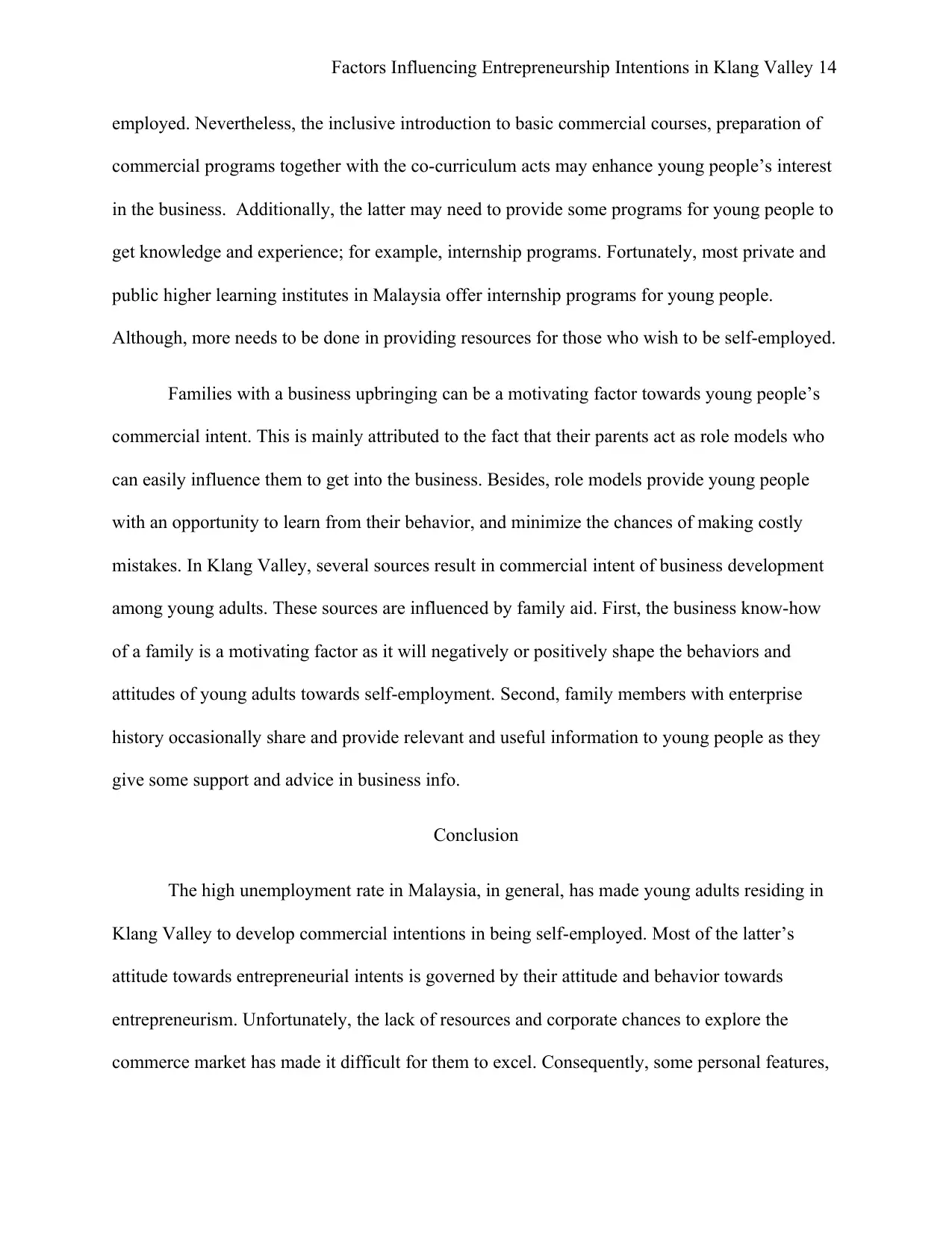
Factors Influencing Entrepreneurship Intentions in Klang Valley 14
employed. Nevertheless, the inclusive introduction to basic commercial courses, preparation of
commercial programs together with the co-curriculum acts may enhance young people’s interest
in the business. Additionally, the latter may need to provide some programs for young people to
get knowledge and experience; for example, internship programs. Fortunately, most private and
public higher learning institutes in Malaysia offer internship programs for young people.
Although, more needs to be done in providing resources for those who wish to be self-employed.
Families with a business upbringing can be a motivating factor towards young people’s
commercial intent. This is mainly attributed to the fact that their parents act as role models who
can easily influence them to get into the business. Besides, role models provide young people
with an opportunity to learn from their behavior, and minimize the chances of making costly
mistakes. In Klang Valley, several sources result in commercial intent of business development
among young adults. These sources are influenced by family aid. First, the business know-how
of a family is a motivating factor as it will negatively or positively shape the behaviors and
attitudes of young adults towards self-employment. Second, family members with enterprise
history occasionally share and provide relevant and useful information to young people as they
give some support and advice in business info.
Conclusion
The high unemployment rate in Malaysia, in general, has made young adults residing in
Klang Valley to develop commercial intentions in being self-employed. Most of the latter’s
attitude towards entrepreneurial intents is governed by their attitude and behavior towards
entrepreneurism. Unfortunately, the lack of resources and corporate chances to explore the
commerce market has made it difficult for them to excel. Consequently, some personal features,
employed. Nevertheless, the inclusive introduction to basic commercial courses, preparation of
commercial programs together with the co-curriculum acts may enhance young people’s interest
in the business. Additionally, the latter may need to provide some programs for young people to
get knowledge and experience; for example, internship programs. Fortunately, most private and
public higher learning institutes in Malaysia offer internship programs for young people.
Although, more needs to be done in providing resources for those who wish to be self-employed.
Families with a business upbringing can be a motivating factor towards young people’s
commercial intent. This is mainly attributed to the fact that their parents act as role models who
can easily influence them to get into the business. Besides, role models provide young people
with an opportunity to learn from their behavior, and minimize the chances of making costly
mistakes. In Klang Valley, several sources result in commercial intent of business development
among young adults. These sources are influenced by family aid. First, the business know-how
of a family is a motivating factor as it will negatively or positively shape the behaviors and
attitudes of young adults towards self-employment. Second, family members with enterprise
history occasionally share and provide relevant and useful information to young people as they
give some support and advice in business info.
Conclusion
The high unemployment rate in Malaysia, in general, has made young adults residing in
Klang Valley to develop commercial intentions in being self-employed. Most of the latter’s
attitude towards entrepreneurial intents is governed by their attitude and behavior towards
entrepreneurism. Unfortunately, the lack of resources and corporate chances to explore the
commerce market has made it difficult for them to excel. Consequently, some personal features,

Factors Influencing Entrepreneurship Intentions in Klang Valley 15
such as the need for accomplishment, individual behaviors, and locus of mechanism influence a
young person’s enterprise activities.
such as the need for accomplishment, individual behaviors, and locus of mechanism influence a
young person’s enterprise activities.
You're viewing a preview
Unlock full access by subscribing today!
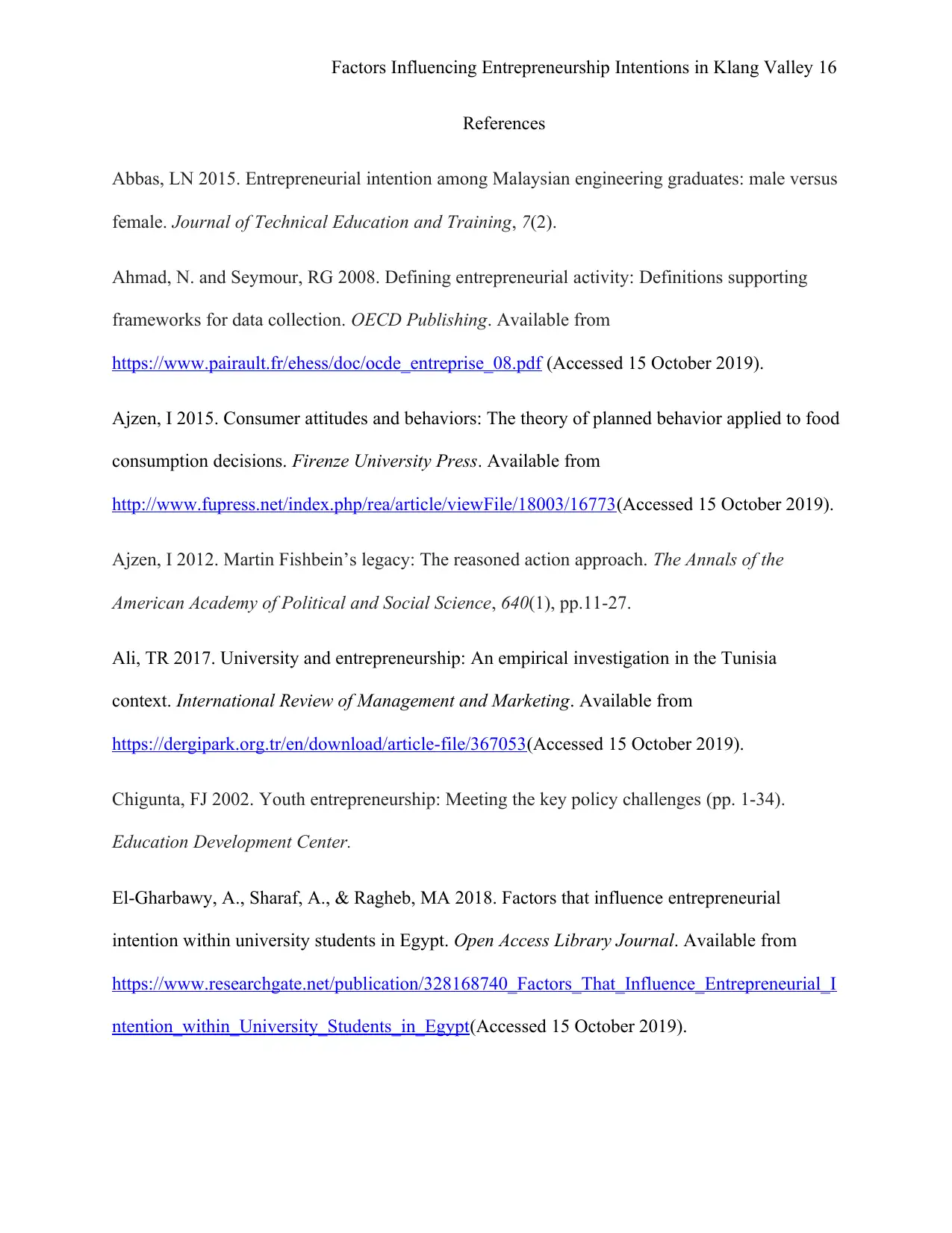
Factors Influencing Entrepreneurship Intentions in Klang Valley 16
References
Abbas, LN 2015. Entrepreneurial intention among Malaysian engineering graduates: male versus
female. Journal of Technical Education and Training, 7(2).
Ahmad, N. and Seymour, RG 2008. Defining entrepreneurial activity: Definitions supporting
frameworks for data collection. OECD Publishing. Available from
https://www.pairault.fr/ehess/doc/ocde_entreprise_08.pdf (Accessed 15 October 2019).
Ajzen, I 2015. Consumer attitudes and behaviors: The theory of planned behavior applied to food
consumption decisions. Firenze University Press. Available from
http://www.fupress.net/index.php/rea/article/viewFile/18003/16773(Accessed 15 October 2019).
Ajzen, I 2012. Martin Fishbein’s legacy: The reasoned action approach. The Annals of the
American Academy of Political and Social Science, 640(1), pp.11-27.
Ali, TR 2017. University and entrepreneurship: An empirical investigation in the Tunisia
context. International Review of Management and Marketing. Available from
https://dergipark.org.tr/en/download/article-file/367053(Accessed 15 October 2019).
Chigunta, FJ 2002. Youth entrepreneurship: Meeting the key policy challenges (pp. 1-34).
Education Development Center.
El-Gharbawy, A., Sharaf, A., & Ragheb, MA 2018. Factors that influence entrepreneurial
intention within university students in Egypt. Open Access Library Journal. Available from
https://www.researchgate.net/publication/328168740_Factors_That_Influence_Entrepreneurial_I
ntention_within_University_Students_in_Egypt(Accessed 15 October 2019).
References
Abbas, LN 2015. Entrepreneurial intention among Malaysian engineering graduates: male versus
female. Journal of Technical Education and Training, 7(2).
Ahmad, N. and Seymour, RG 2008. Defining entrepreneurial activity: Definitions supporting
frameworks for data collection. OECD Publishing. Available from
https://www.pairault.fr/ehess/doc/ocde_entreprise_08.pdf (Accessed 15 October 2019).
Ajzen, I 2015. Consumer attitudes and behaviors: The theory of planned behavior applied to food
consumption decisions. Firenze University Press. Available from
http://www.fupress.net/index.php/rea/article/viewFile/18003/16773(Accessed 15 October 2019).
Ajzen, I 2012. Martin Fishbein’s legacy: The reasoned action approach. The Annals of the
American Academy of Political and Social Science, 640(1), pp.11-27.
Ali, TR 2017. University and entrepreneurship: An empirical investigation in the Tunisia
context. International Review of Management and Marketing. Available from
https://dergipark.org.tr/en/download/article-file/367053(Accessed 15 October 2019).
Chigunta, FJ 2002. Youth entrepreneurship: Meeting the key policy challenges (pp. 1-34).
Education Development Center.
El-Gharbawy, A., Sharaf, A., & Ragheb, MA 2018. Factors that influence entrepreneurial
intention within university students in Egypt. Open Access Library Journal. Available from
https://www.researchgate.net/publication/328168740_Factors_That_Influence_Entrepreneurial_I
ntention_within_University_Students_in_Egypt(Accessed 15 October 2019).
Paraphrase This Document
Need a fresh take? Get an instant paraphrase of this document with our AI Paraphraser
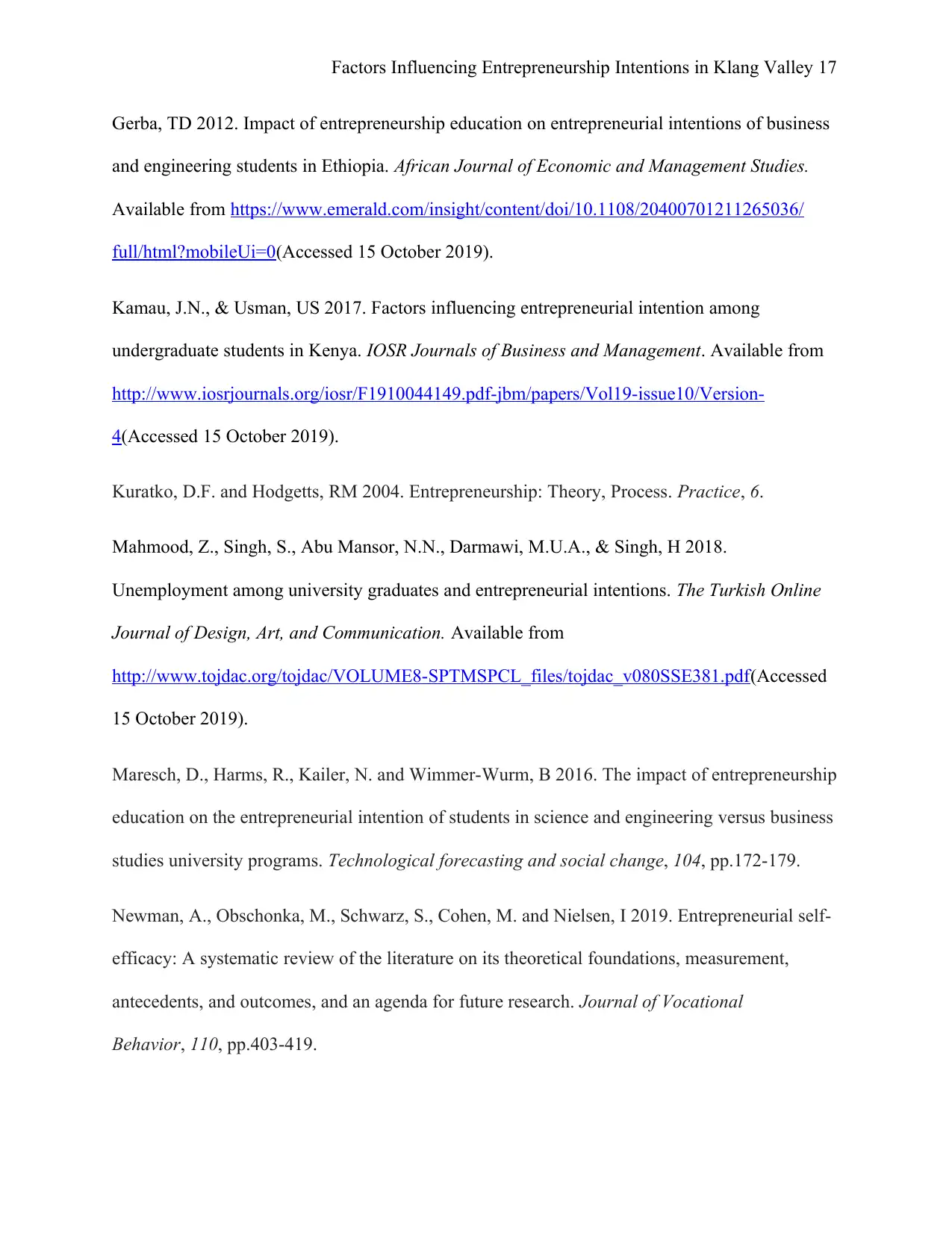
Factors Influencing Entrepreneurship Intentions in Klang Valley 17
Gerba, TD 2012. Impact of entrepreneurship education on entrepreneurial intentions of business
and engineering students in Ethiopia. African Journal of Economic and Management Studies.
Available from https://www.emerald.com/insight/content/doi/10.1108/20400701211265036/
full/html?mobileUi=0(Accessed 15 October 2019).
Kamau, J.N., & Usman, US 2017. Factors influencing entrepreneurial intention among
undergraduate students in Kenya. IOSR Journals of Business and Management. Available from
http://www.iosrjournals.org/iosr/F1910044149.pdf-jbm/papers/Vol19-issue10/Version-
4(Accessed 15 October 2019).
Kuratko, D.F. and Hodgetts, RM 2004. Entrepreneurship: Theory, Process. Practice, 6.
Mahmood, Z., Singh, S., Abu Mansor, N.N., Darmawi, M.U.A., & Singh, H 2018.
Unemployment among university graduates and entrepreneurial intentions. The Turkish Online
Journal of Design, Art, and Communication. Available from
http://www.tojdac.org/tojdac/VOLUME8-SPTMSPCL_files/tojdac_v080SSE381.pdf(Accessed
15 October 2019).
Maresch, D., Harms, R., Kailer, N. and Wimmer-Wurm, B 2016. The impact of entrepreneurship
education on the entrepreneurial intention of students in science and engineering versus business
studies university programs. Technological forecasting and social change, 104, pp.172-179.
Newman, A., Obschonka, M., Schwarz, S., Cohen, M. and Nielsen, I 2019. Entrepreneurial self-
efficacy: A systematic review of the literature on its theoretical foundations, measurement,
antecedents, and outcomes, and an agenda for future research. Journal of Vocational
Behavior, 110, pp.403-419.
Gerba, TD 2012. Impact of entrepreneurship education on entrepreneurial intentions of business
and engineering students in Ethiopia. African Journal of Economic and Management Studies.
Available from https://www.emerald.com/insight/content/doi/10.1108/20400701211265036/
full/html?mobileUi=0(Accessed 15 October 2019).
Kamau, J.N., & Usman, US 2017. Factors influencing entrepreneurial intention among
undergraduate students in Kenya. IOSR Journals of Business and Management. Available from
http://www.iosrjournals.org/iosr/F1910044149.pdf-jbm/papers/Vol19-issue10/Version-
4(Accessed 15 October 2019).
Kuratko, D.F. and Hodgetts, RM 2004. Entrepreneurship: Theory, Process. Practice, 6.
Mahmood, Z., Singh, S., Abu Mansor, N.N., Darmawi, M.U.A., & Singh, H 2018.
Unemployment among university graduates and entrepreneurial intentions. The Turkish Online
Journal of Design, Art, and Communication. Available from
http://www.tojdac.org/tojdac/VOLUME8-SPTMSPCL_files/tojdac_v080SSE381.pdf(Accessed
15 October 2019).
Maresch, D., Harms, R., Kailer, N. and Wimmer-Wurm, B 2016. The impact of entrepreneurship
education on the entrepreneurial intention of students in science and engineering versus business
studies university programs. Technological forecasting and social change, 104, pp.172-179.
Newman, A., Obschonka, M., Schwarz, S., Cohen, M. and Nielsen, I 2019. Entrepreneurial self-
efficacy: A systematic review of the literature on its theoretical foundations, measurement,
antecedents, and outcomes, and an agenda for future research. Journal of Vocational
Behavior, 110, pp.403-419.
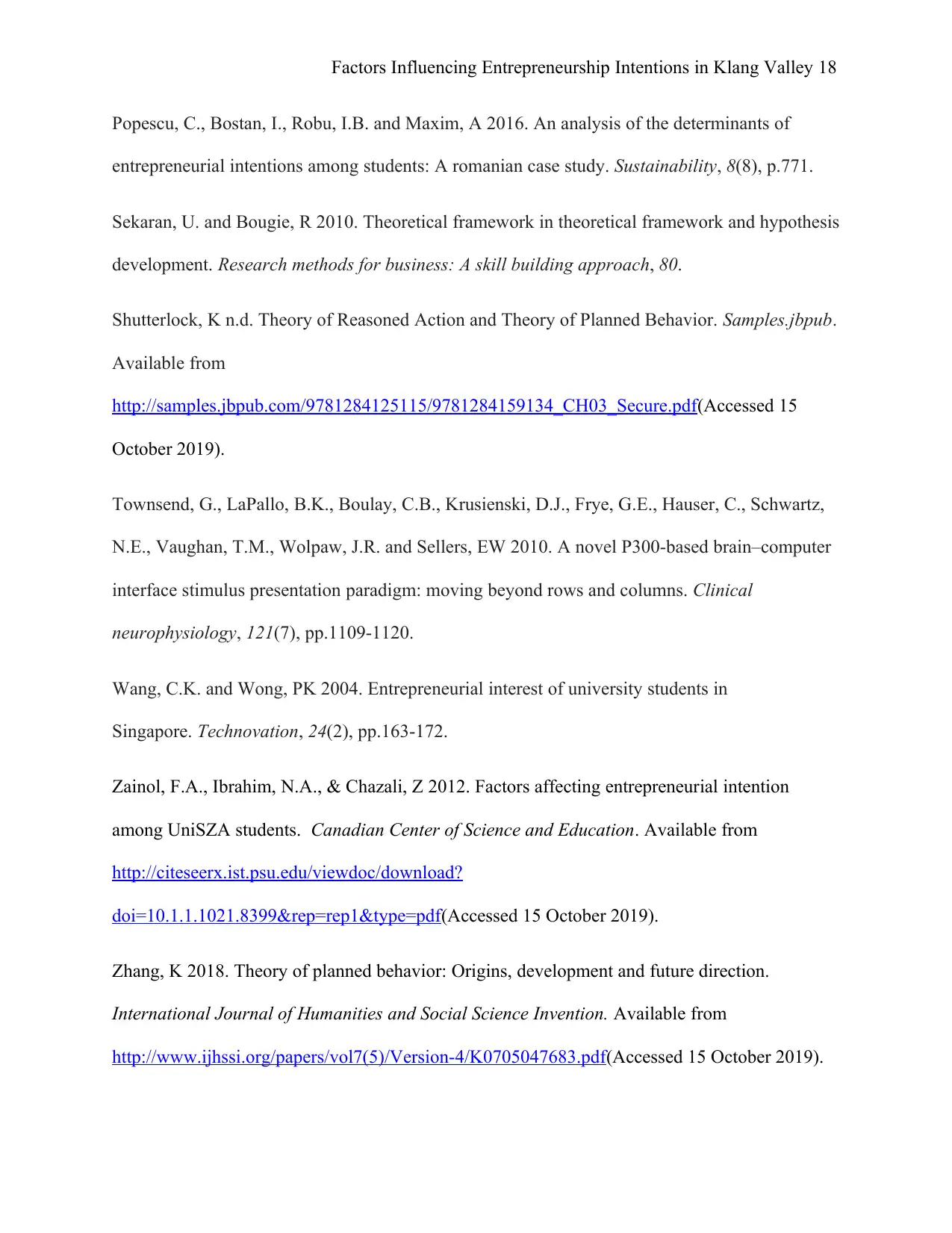
Factors Influencing Entrepreneurship Intentions in Klang Valley 18
Popescu, C., Bostan, I., Robu, I.B. and Maxim, A 2016. An analysis of the determinants of
entrepreneurial intentions among students: A romanian case study. Sustainability, 8(8), p.771.
Sekaran, U. and Bougie, R 2010. Theoretical framework in theoretical framework and hypothesis
development. Research methods for business: A skill building approach, 80.
Shutterlock, K n.d. Theory of Reasoned Action and Theory of Planned Behavior. Samples.jbpub.
Available from
http://samples.jbpub.com/9781284125115/9781284159134_CH03_Secure.pdf(Accessed 15
October 2019).
Townsend, G., LaPallo, B.K., Boulay, C.B., Krusienski, D.J., Frye, G.E., Hauser, C., Schwartz,
N.E., Vaughan, T.M., Wolpaw, J.R. and Sellers, EW 2010. A novel P300-based brain–computer
interface stimulus presentation paradigm: moving beyond rows and columns. Clinical
neurophysiology, 121(7), pp.1109-1120.
Wang, C.K. and Wong, PK 2004. Entrepreneurial interest of university students in
Singapore. Technovation, 24(2), pp.163-172.
Zainol, F.A., Ibrahim, N.A., & Chazali, Z 2012. Factors affecting entrepreneurial intention
among UniSZA students. Canadian Center of Science and Education. Available from
http://citeseerx.ist.psu.edu/viewdoc/download?
doi=10.1.1.1021.8399&rep=rep1&type=pdf(Accessed 15 October 2019).
Zhang, K 2018. Theory of planned behavior: Origins, development and future direction.
International Journal of Humanities and Social Science Invention. Available from
http://www.ijhssi.org/papers/vol7(5)/Version-4/K0705047683.pdf(Accessed 15 October 2019).
Popescu, C., Bostan, I., Robu, I.B. and Maxim, A 2016. An analysis of the determinants of
entrepreneurial intentions among students: A romanian case study. Sustainability, 8(8), p.771.
Sekaran, U. and Bougie, R 2010. Theoretical framework in theoretical framework and hypothesis
development. Research methods for business: A skill building approach, 80.
Shutterlock, K n.d. Theory of Reasoned Action and Theory of Planned Behavior. Samples.jbpub.
Available from
http://samples.jbpub.com/9781284125115/9781284159134_CH03_Secure.pdf(Accessed 15
October 2019).
Townsend, G., LaPallo, B.K., Boulay, C.B., Krusienski, D.J., Frye, G.E., Hauser, C., Schwartz,
N.E., Vaughan, T.M., Wolpaw, J.R. and Sellers, EW 2010. A novel P300-based brain–computer
interface stimulus presentation paradigm: moving beyond rows and columns. Clinical
neurophysiology, 121(7), pp.1109-1120.
Wang, C.K. and Wong, PK 2004. Entrepreneurial interest of university students in
Singapore. Technovation, 24(2), pp.163-172.
Zainol, F.A., Ibrahim, N.A., & Chazali, Z 2012. Factors affecting entrepreneurial intention
among UniSZA students. Canadian Center of Science and Education. Available from
http://citeseerx.ist.psu.edu/viewdoc/download?
doi=10.1.1.1021.8399&rep=rep1&type=pdf(Accessed 15 October 2019).
Zhang, K 2018. Theory of planned behavior: Origins, development and future direction.
International Journal of Humanities and Social Science Invention. Available from
http://www.ijhssi.org/papers/vol7(5)/Version-4/K0705047683.pdf(Accessed 15 October 2019).
You're viewing a preview
Unlock full access by subscribing today!
1 out of 18
Related Documents
Your All-in-One AI-Powered Toolkit for Academic Success.
+13062052269
info@desklib.com
Available 24*7 on WhatsApp / Email
![[object Object]](/_next/static/media/star-bottom.7253800d.svg)
Unlock your academic potential
© 2024 | Zucol Services PVT LTD | All rights reserved.





